As we celebrate the 100th anniversary of Women’s Suffrage in the United States, this series of posts puts the 19th amendment in context of our own ancestors.
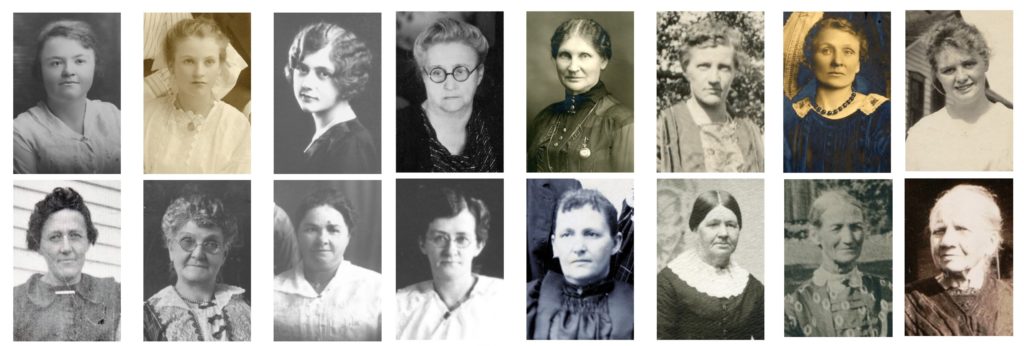
“The right of citizens of the United States to vote shall not be denied or abridged by the United States or by any State on account of sex.”
19th Amendment
This is the fourth post in our series on women’s suffrage.
In the first post you were introduced to our sixteen female ancestors who were alive when the 19th Amendment was ratified. In the second, you got a brief history lesson on voting prior to the 19th Amendment.
This post and the previous post discuss what our ladies missed in the elections in which they were prohibited from voting.
This post covers the presidential elections from 1896 through 1916.
We are only profiling the sixteen female ancestors who gained full voting rights when the 19th Amendment was signed on August 26, 1920. But, even though they aren’t being called out by name, generations and generations of other women before them in our family trees were also denied the right to vote. There were 17 presidents before the missed elections we are discussing here.
Elections missed
If things had been fair, all twelve of our sixteen ladies would have been able vote in presidential elections earlier than 1920. They were prohibited in participating in a lot of important decisions. Because most of us didn’t learn a lot about presidents other than big names like Washington and Lincoln, we’ll continue looking at the elections from 1868 to 1916, before women’s suffrage. We’ll review a little about American politics and presidents in the lifetimes of our sixteen suffrage ancestors. These are the elections in which our ladies couldn’t cast a vote just because they were ladies.
1896
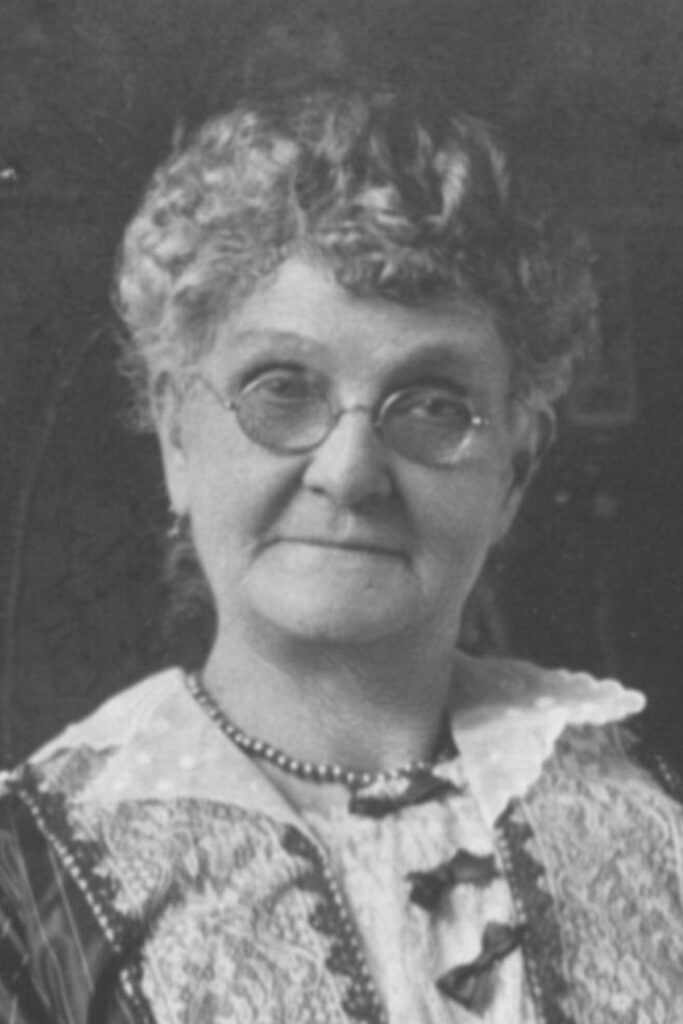
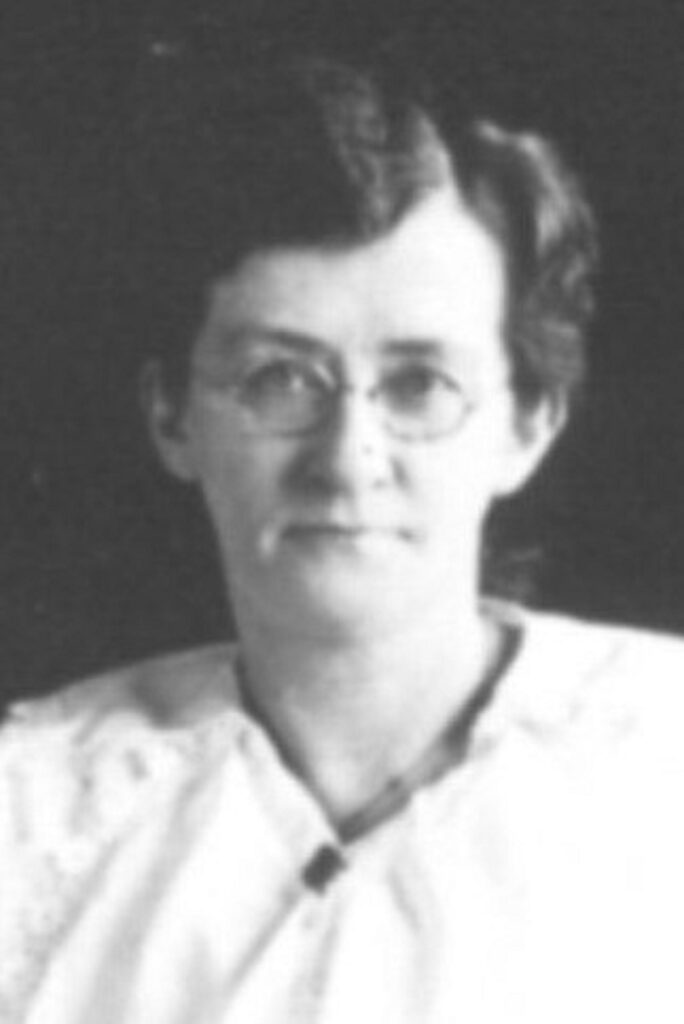
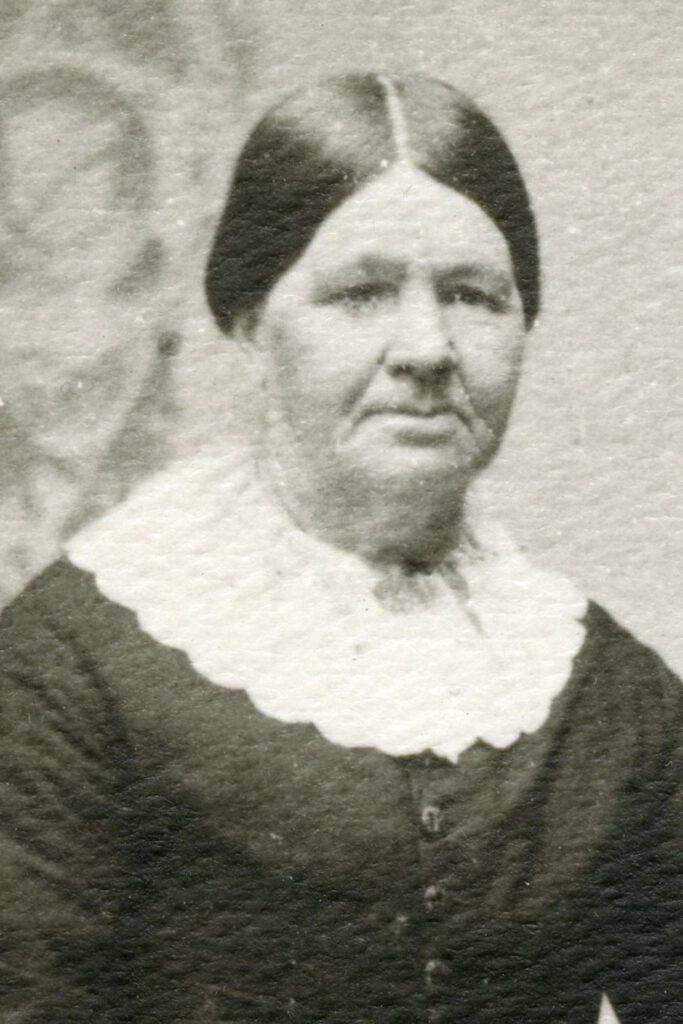
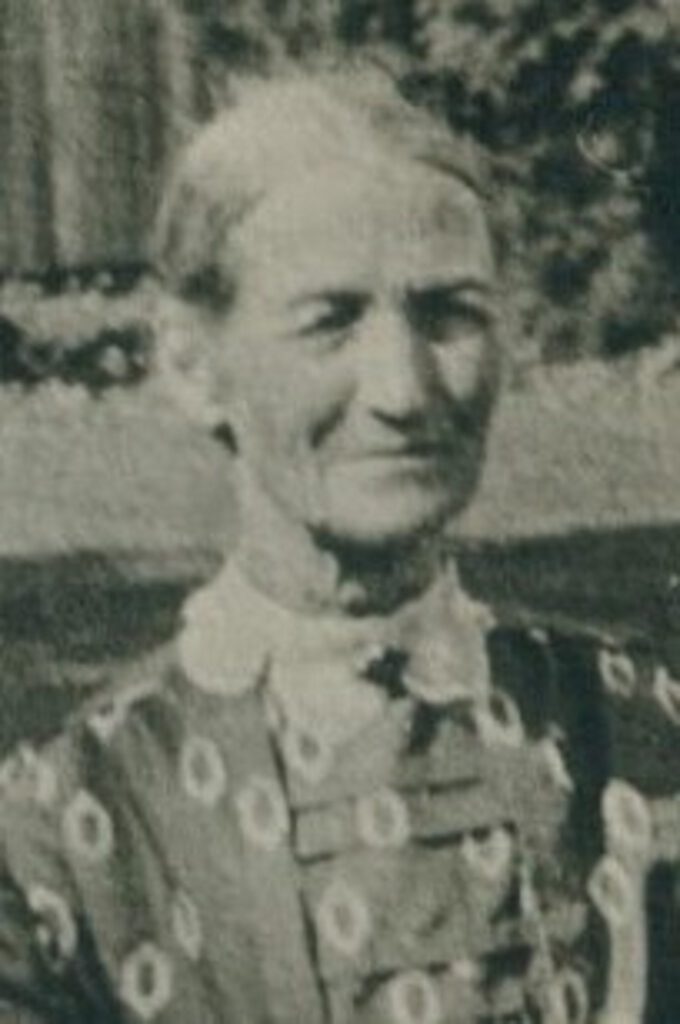
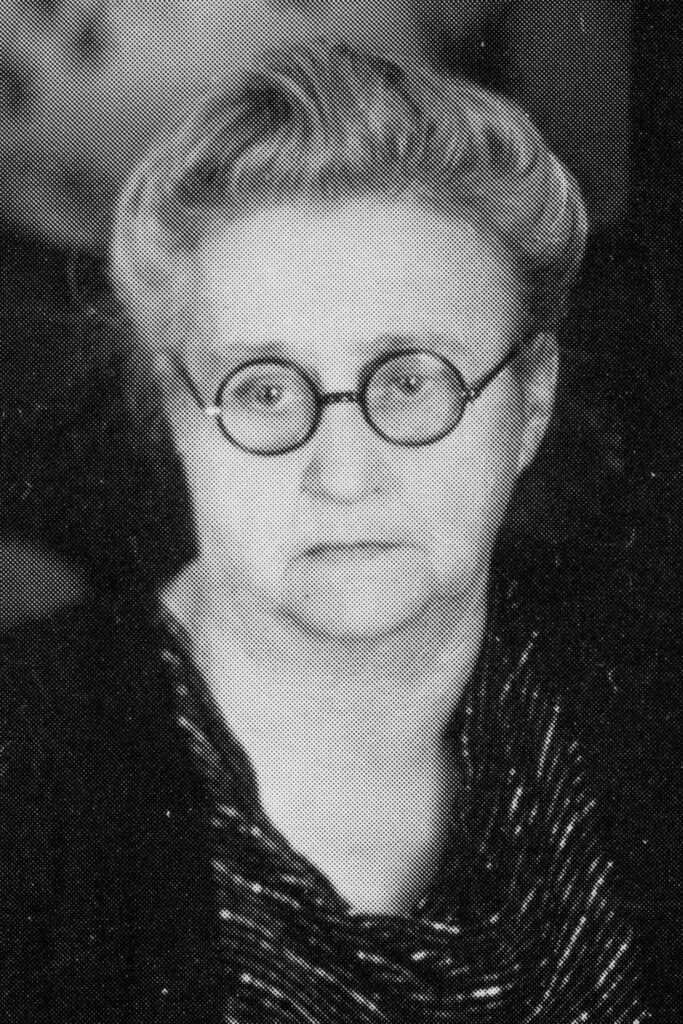
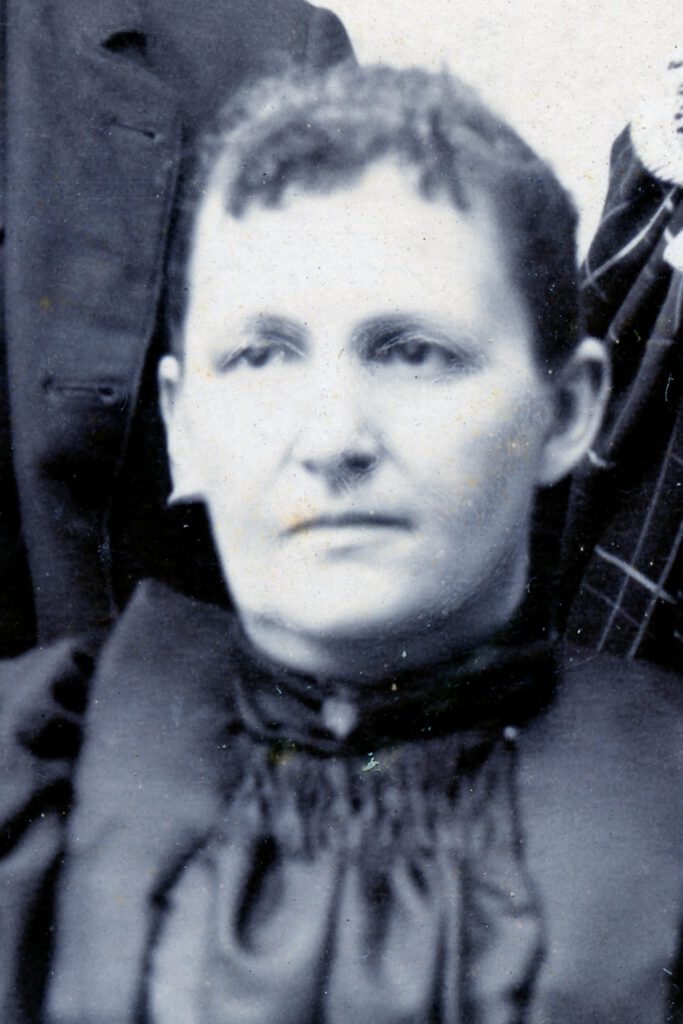
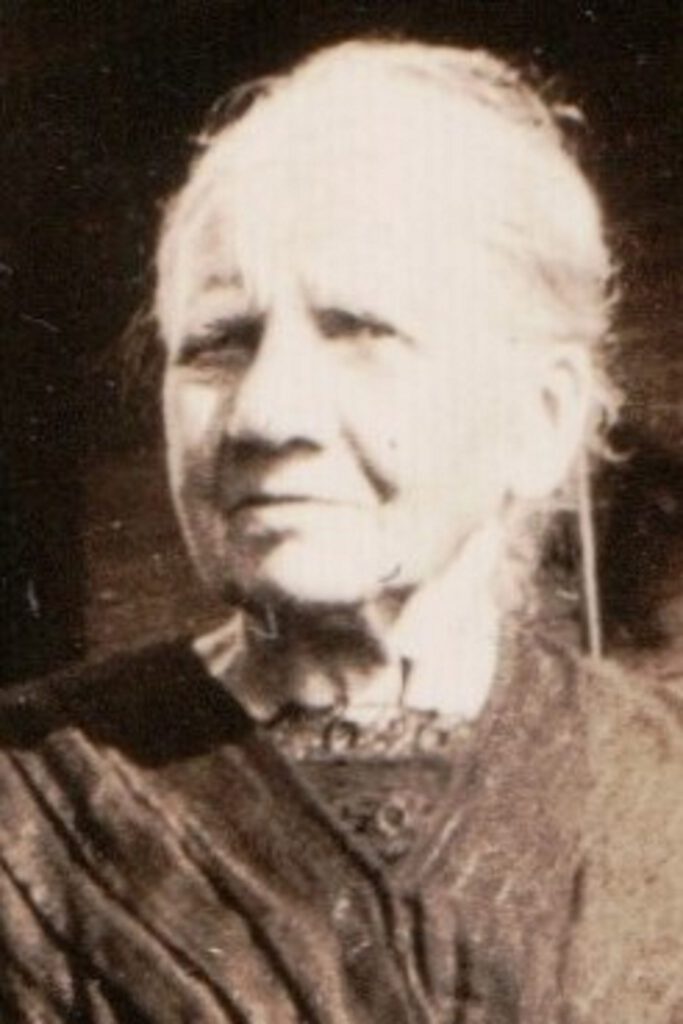
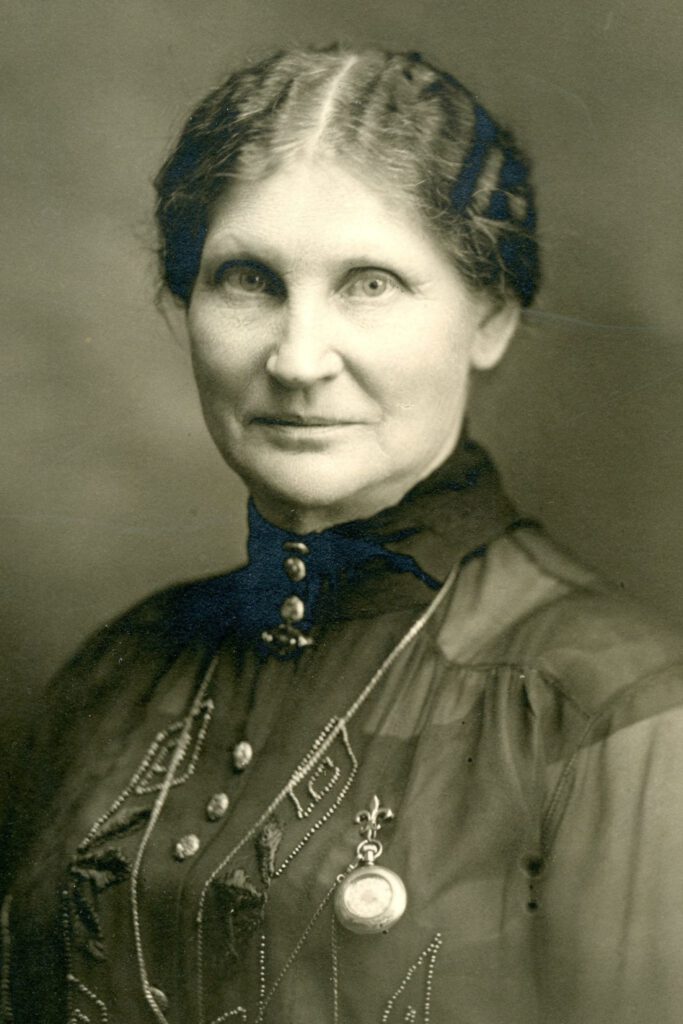
At the time of the 1896 presidential election, eight of our profiled ancestors were old enough to vote. But, because they were women, they were kept away from the polling place.
Amelia “Millie” Brace Phillips
Amelia Brace Phillips was 52-years old at the time of the 1896 election. But she couldn’t vote. She and her husband, Albert “Tom” Alvedo Phillips, lived and farmed in Aurora Township, Kane County, Illinois. Their oldest sons Guy and Frank had married, but the five younger sons, Clarence, Edmund, Charles, Harold, and Faye were still single. The sons at home ranged in age from 16 to 26.
Gertrude Lovin Boyce Phillips
Gertrude Lovin Boyce Phillips was Amelia’s daughter-in-law, having married Guy Allison Phillips in 1888. In 1896, Gertrude was 31-years old and the mother to four sons, Roy, Albert, Floyd, and Arthur. The boys ranged in age from two to seven. The previous year, Guy and Gertrude had move to a 189-acre farm they bought on the Jericho Road at Sugar Grove, Kane County, Illinois. She worked hard on the farm. In her memoir she wrote that she painted all the woodwork in the house. She also mentioned that she Mother Phillips’ (Amelia’s) laundry so that she could earn money to replace 15-pane windows with 4-panes. Not every day on the farm was pleasant. She shared one such account.
Must to my dismay in early warm summer accidentally discovered the house tenanted with bed bugs. When I’d put Arthur in his bed up stairs for a nap he’d cling to me crying. I thot he was peppered with hives and went to the Dr. To my horror mother suggested bugs. Carrie Smith worked for me most of that year. So we investigated finding them all over the house. O my! O me! what a siege. Straw ticks, my three pillow davenport, I had recently upholstered were burned, tore off seven layers of wall paper, plugged holes in painted wood work, picture nail holes in walls where at night the bugs played pullaway then feasted. All walls were washed down with boiling lye water and a broom followed by a few days and nights of fumigation. This was my special job of that long, long siege. Each week the beds were thoroly inspected and persistence won.
Gertrude Lovin Boyce Phillips, memoir.
Jane Elizabeth Cornell Miller
Jane Elizabeth Cornell Miller was in Illinois too. She and her husband, George Leifheite Miller, lived at Big Rock, Kane County, Illinois. Jane was 43-years old at the time of the 1896 election. He oldest son, Calvin, and her daughter, Elvira, had both married the previous year. Sons Frank and Edward J., ages 22 and 18, were still single. Son Frank would have been allowed to vote. Jane was prohibited because she was female.
Barebo Engebretsdtr Torset Christianson
Barebo Engebretsdtr Torset Christianson, a Norwegian immigrant, was 48-years old at the time of the 1896 election. But she couldn’t vote. She and her husband, Björn Christianson Rukke, were still farming in Udolpho Township, Mower County, Minnesota. Of the ten children of Barebo and Bennett, as her husband was known, only one had married by 1896. The oldest daughter, Ragnild, married in 1893. The other children, Mary, Christian, Ingebret, Jorgine, Clara, Lena, Maline, Inga, and Bennett, were still single and ranged in age from seven to 24. Son Christian was old enough to vote. Being a woman, Barebo wasn’t allowed to vote.
Caroline Hilson Aldahl
Thirty-three-year old Caroline Hilson Aldahl lived near Barebo, in Lansing Township, Mower County, Minnesota. They attended the same church, Red Oak Grove Lutheran. Services were still held in Norwegian there. Caroline was married to Lars Olson Aldahl, a Norwegian immigrant. In April 1896, Caroline had given birth to another daughter. So, at the time of the election she was mother to Johanna, George, Clara, Selmer, Ida, Hilda, Judith (called Nellie), and Olga, who ranged in age from newborn to age ten.
Helen Lucina Baldwin Fawcett
Helen Lucina Baldwin Fawcett was 41-years old at the time of the 1896 presidential election. She was married to James Wood “Hugh” Huleress Fawcett. Her son Franklin had married the previous year, so Helen was now a mother-in-law in addition to being a mother. Her children Harry, George Emerson, and Mary Lorena were still single. The family was probably still in Adair County, Iowa at this time, though they would soon be moving to Grinnell, Poweshiek County, Iowa.
Bertha Auguste Henriette Kluender
Bertha Auguste Henriette Kluender Aschbrenner lived at the Town of Berlin, Marathon County, Wisconsin, in 1896. She was 48-years old and still married to Frederick Wilhelm Aschbrenner. By this time, one step-daughter had married and given her three grandchildren. Bertha’s children, Frederick, Otto, Edward, Henry, Laura, Frank, Samuel, and Hilda, who ranged in age from four to 22, were all single. Oldest son Frederick was eligible to vote. Bertha wasn’t.
Clara Christine Elsabe Freese Lemke
Clara Christine Elsabe Freese Lemke was in the midst of divorce proceedings at the time of the 1896 presidential election. Her husband Johann Carl Friedrich Lemke had disappeared. Even the sheriff was unsuccessful in finding Carl, so Clara filed for divorce. She worked as a midwife to support her four children, Frieda, Clara, Elsa, and Johannes “Max.” The kids ranged in age from two to fifteen. They lived in the city of Wausau, Marathon County, Wisconsin.
Bryan versus McKinley
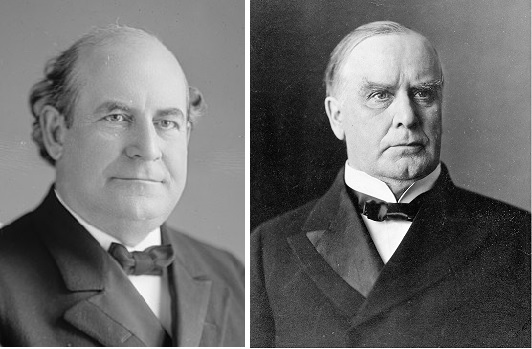
William Jennings Bryan (D) v. William McKinley (R).
The election of 1896 was all about the U.S. money supply.
The worst economic depression to that date had begun in 1893 and politicians and the public alike were torn on whether the U.S. should retain its gold standard for money or moved to a bimetallic standard where both gold and silver backed our currency. While things were recovering by 1896, many people were still hungry and many craved a change to the present economic system.
The concept of free silver was being pushed to cause currency inflation and help alleviate the depression. The free silver movement pushed for unlimited coinage of silver. The silver dollar had been left out of a list of authorized coins in 1873. People who pushed the free silver movement included silver mine owners from the West, farmers who thought that an expanded currency would increase the price of their crops, and people who were in debt and thought that it might help them pay off what they owned sooner.
Others believed that the U.S. should remain on the gold standard, with a more carefully fixed money supply. They believed there shouldn’t be money in circulation that wasn’t based on a fixed quantity of gold.
We’d used the free silver concept to help get out a depression in the 1870s, so it wasn’t a new concept.
The democrats and their candidate William Jennings Bryan were in favor of free silver and a bimetallic standard of gold and silver. The Populist party who had made a wave in the 1892 election, stood behind Bryan.
William McKinley and the republicans ran on a platform of maintaining the gold standard.
Bryan traveled thousands of miles to campaign. He developed a reputation as a defender of the farmer. He is most remembered from the 1896 for saying in support of free silver, “You shall not crucify mankind upon a cross of gold!”
McKinley stayed home and greeted visiting groups of republicans at his front porch. Led by a wealthy Cleveland industrialist named Mark Hanna, who vowed to see McKinley elected, cries went out for money to support McKinley. Big business made large campaign contributions to the republicans. Hanna and a network of republican speakers traveled giving speeches in support of McKinley. They tried to sell the democrat, Bryan, as a dangerous radical. They claimed that their candidate, McKinley was the advance agent of prosperity.
The election pitted city folk against country folk. Farmers who were saddled by debt and mortgages would benefit from a move to bimetallic currency. Factory owners feared the free silver idea. Their workers who earned wages and paid rent did as well.
McKinley won the popular vote and the electoral college vote and became the 25th president of the United States.
1900
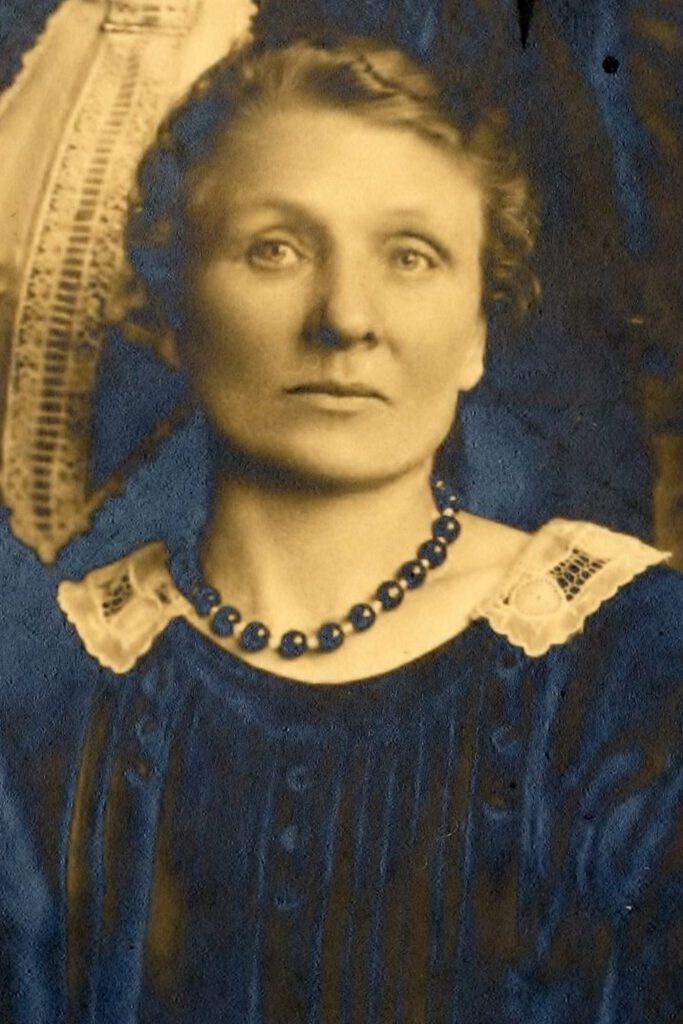








At the time of the 1900 presidential election, nine of our profiled ancestors were old enough to vote. But, because they were women, they were kept away from the polling place.
Bertha H. Stemson Christianson
Bertha H. Stemson Christianson was added to the list of non-voting women. In 1900, she was 23-years old, married to Christian Bennett Christianson, and the mother of two daughters, Blanche and Hilda. They farmed at Newry Township, Freeborn County, Minnesota.
Barebo Engebretsdtr Torset Christianson
Barebo Engebretsdtr Torset Christianson, was 52-years old at the time of the 1900 election. With Bertha Stemson’s marriage to Christian Bennett Christianson a couple years earlier, Barebo had become Bertha’s mother-in-law. Barebo and her husband, Björn Christianson Rukke, were still farming in Udolpho Township, Mower County, Minnesota. Seven of their children still lived at home, namely, Mary, Ingebret, Clara, Lena, Maline, Inga, and Bennett.
Caroline Hilson Aldahl
In 1900, Caroline Hilson Aldahl was 37-years old. She and her husband, Lars Aldahl, were the parents of ten children, namely, Johanna, George, Clara, Selmer, Ida, Hilda, Judith, Olga, Noel Clarence, and Joseph. Joseph, the youngest was born in March 1900. Johanna, the oldest was 14-years old. The oldest six children attended school. The family lived on their farm in Lansing Township, Mower County, Minnesota.
Clara Christine Elsabe Freese Lemke Boettcher
Clara Christine Elsabe Freese Lemke Boettcher was remarried to a widower, August F. Boettcher, by the time of the 1900 presidential election. Her daughter Frieda had married and left the home. August’s children, Otto and Ida, became Clara’s step-children. Clara and August had had a son together in 1898. At the time of the 1900 Federal Census, Clara and August were renting a house at 505 Scott in Wausau, Marathon County, Wisconsin. Living with Clara were her husband, step-children, youngest son, Lawrence, and her older children, Clara, Elsa, and Johannes “Max.” August worked as a day laborer, and Clara, at age 41, was still working as a midwife.
Bertha Auguste Henriette Kluender
Bertha Auguste Henriette Kluender Aschbrenner lived with her husband Frederick on their farm at the Town of Berlin, Marathon County, Wisconsin in 1900. She was 52-years old. Children, Frederick, Otto, Edward, Henry, Laura, Frank, Samuel, and Hilda all lived at home. They ranged in age from eight to 26. Frederick and Otto were farm laborers. Henry was a laborer. The rest of the kids were at school.
Jane Elizabeth Cornell Miller
Jane was 47-years old, at the time of the 1900 presidential election. She, her husband, George, and youngest son, Edward, still lived on the farm George owned at Big Rock, Kane County, Illinois. The 1900 census shows that a 17-year old hired man lived with them too. He was there to do farm work. It was not uncommon then to have farm laborers living on a farm with the family. The older three children were all married and living away from home. Jane was blessed with four granddaughters by 1900. This was a sad year for Jane. Her grandmother, Jane Russell Palmer, who had raised Jane, passed away on 01 Mar 1900, at the age of 81.
Amelia “Millie” Brace Phillips
At the time of the 1900 presidential election, Amelia was 56-years old. She and her husband, Tom, lived in a home they owned at 300 Lake Street, Aurora, Kane County, Illinois. He had retired from farming. At least son Harold “Hal,” an electric street railroad conductor in nearby Chicago, lived at home. Another son Charles got married that year. All seven boys were grown. Faye, the youngest was 20-years old and Guy, the oldest, was 34.
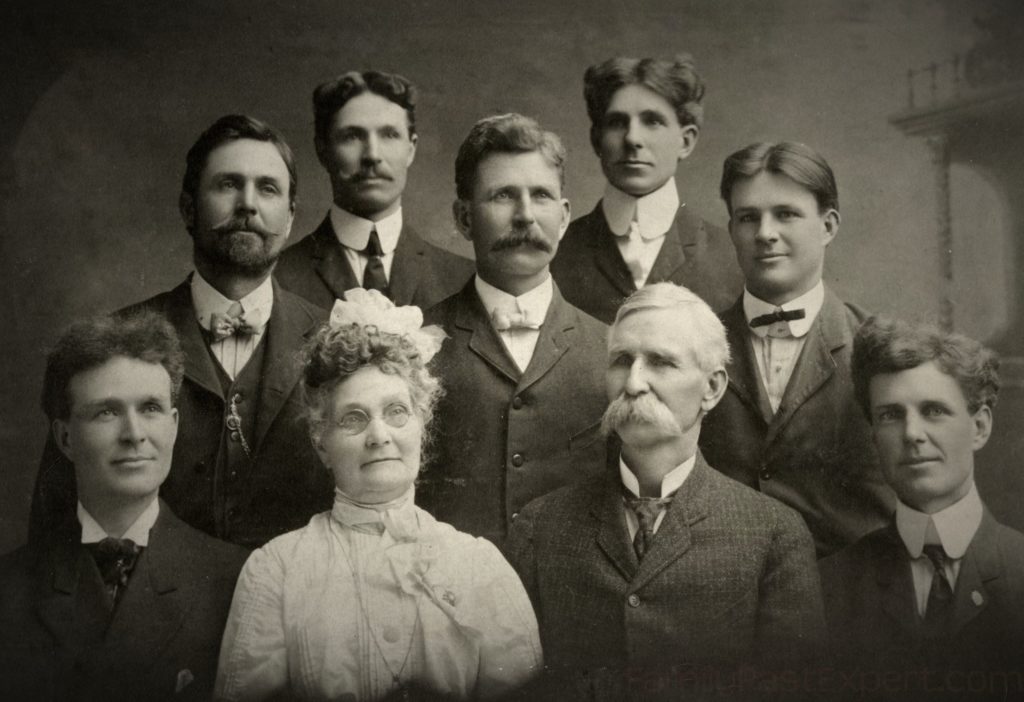
Gertrude Lovin Boyce Phillips
Gertrude was 35-years old at the time of the 1900 presidential election. She was mother to five sons, Roy, Albert, Floyd, Arthur, and Charles. The boys ranged in age from three to 11. She and her husband Guy Phillips were busy with their farm on the Jericho Road at Sugar Grove, Kane County, Illinois. Guy also owned a share in a threshing business with his brother, Frank. In her memoir, she talked of, then common, diseases that affected the family. There was whooping cough. She reported that “Floyd was the only to whoop.” There was measles. There was chicken pox. There was scarlet fever. Guy contracted typhoid fever. There was diphtheria. There were mumps. Neighbors helped during times of sickness.
Helen Lucina Baldwin Fawcett
At the time of the 1900 presidential election, Helen Lucina Baldwin Fawcett was 45-years old. Her children Harry, Franklin, and Mary had all married by this time and Helen had just become a grandmother. Son George Emerson was living on his own too, so Helen and her husband, Hugh, had an empty nest. They lived in Grinnell, Poweshiek County, Iowa. Helen worked as a washerman and Hugh was a teamster.
Bryan versus McKinley (again)

William Jennings Bryan (D) v. William McKinley (R).
It was William Jennings Bryan versus William McKinley again in the 1900 presidential election.
The main issues surrounded the United States’ foreign policies.
In his first term, McKinley was tough against Spain in their repression of Cuba. Spain gave into most of McKinley’s demands, but did not want to give up control of Cuba, its last remaining colony in the Americas. In 1898, the US declared war on Spain. The Spanish-American war was brief. The US easily beat Spanish troops in Cuba, the Philippines, and in Puerto Rico. The resulting treaty gave the Philippines, Puerto Rico, and Guam to us. Cuba became an independent nation.
McKinley campaigned on a platform of tough and expansionist foreign policy. He believed, for example, that the anti-American rebellion in the Philippines had to be stopped. He pushed for military intervention and sold his policy by saying that the US had a moral obligation to civilize and Christianize the residents of the Philippines.
Tariffs were up for debate again. The republicans wanted to ensure that an 1897 tariff continued. That tariff strongly protected American businesses.
A new issue for this campaign dealt with where a canal should go. Originally, the idea was to build one through Nicaragua. But, influenced by large donations, the republicans now pushed for it to be built in Panama.
McKinley’s first-term Vice President had died in office. For a new running mate, he chose Theodore Roosevelt. Roosevelt was a military hero, known for his success in the Spanish-American War.
The Democrats (and Populists) and their candidate Bryan, argued against McKinley’s imperialism and empire building. They also pushed again for free silver or bimetallism as they had in the previous election. They favored the new canal to be built, as originally planned, through Nicaragua.
Bryan did a lot of campaigning. He delivered over 600 speeches and visited more than half of the nation’s 45 states. As in the previous election, McKinley left most of the campaigning to others. Mark Hanna, who was instrumental in getting him elected in 1896, again raised funds and gave speeches. VP candidate, Roosevelt also gave speeches and attended debates throughout the country.
It was hard for Bryan to compete with McKinley’s recent victory in the Spanish-American War and it was hard to push for new economic policies when the country was booming and back to a climate of economic prosperity.
McKinley won, but did not get to serve his full second term. He was assassinated In September 1901. Upon McKinley’s death, his vice president, Theodore Roosevelt, assumed the office of president and became the nation’s 26th president.
1904


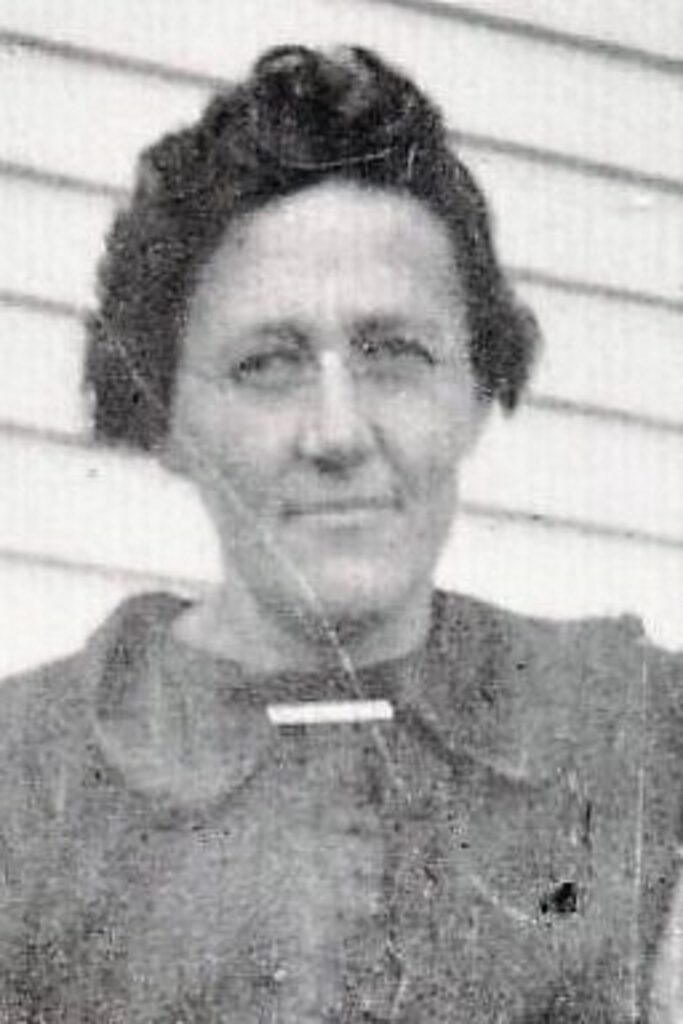

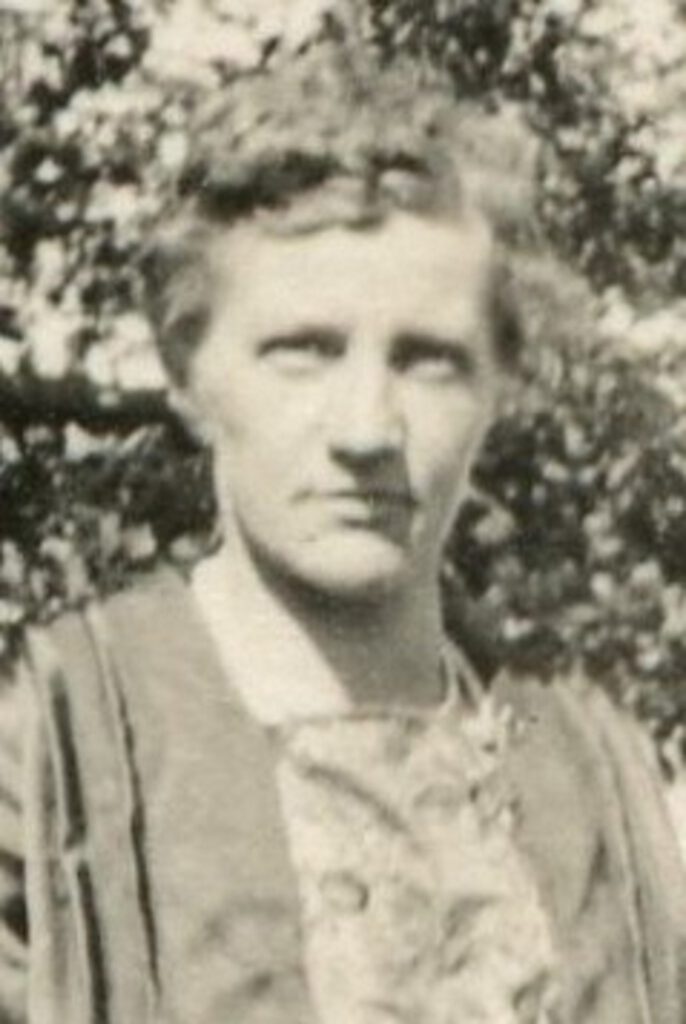





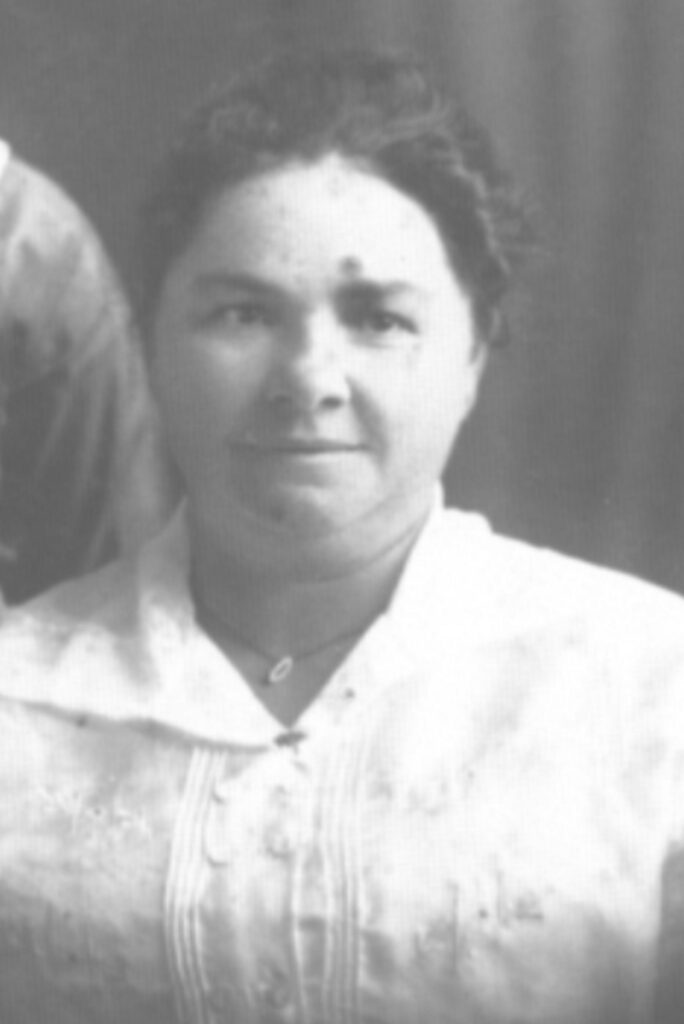

Twelve of our featured ancestors were denied the right to vote in the 1904 presidential election.
Jane Elizabeth Cornell Miller
In 1904, Jane turned 51-years old. She and George continued to live on their Big Rock, Kane County, Illinois, farm. Their youngest son married in 1902. Her first grandson was born in 1902 as well. By 1904, Jane was grandmother to seven.
Bertha Auguste Henriette Kluender Aschbrenner
By election time in 1904, Bertha’s sons Fred and Otto had married. Bertha and Frederick has turned their farm in Town of Berlin over to their son Fred. They were working to clear land and erect a brick veneered home on their new farm in Stratford, Marathon County, Wisconsin. Their children Edward, Henry, Laura, Frank, Samuel, and Hilda all lived at home, though at least Sam helped on the Town of Berlin farm as well.
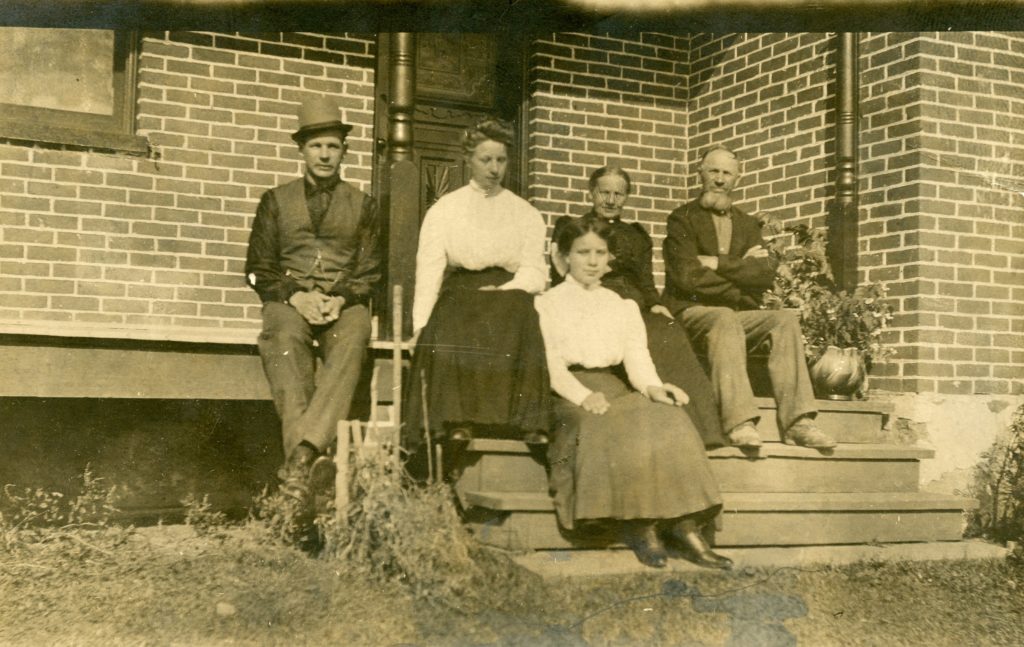
Alice Rosalie Fehlhaber Aschbrenner
Alice Rosalie Fehlhaber was the bride of Bertha’s son Frederick A. Helmut Aschbrenner. By the time of the 1904 election, she was 24-years old. Their first child, a daughter Selma Cornelia Aschbrenner, was born that year. Fred and Alice resided on the farm on Highway A, Town of Berlin, Marathon County, Wisconsin, that he had grown up on and that his grandfather had originally homesteaded upon arrival in the United States.
Clara Christine Elsabe Freese Lemke Boettcher
Clara was 45-years old during the 1904 presidential election. She and husband August F. Boettcher continued to live in Wausau, Marathon County, Wisconsin. Kids Clara, Elsie, Otto, Ida, Max, and Lawrence lived at home. They ranged in age from six to 16. August worked as a day laborer and Clara was as a midwife.
Frieda H. Lemke Krueger
Frieda H. Lemke Krueger was 23-years old at the time of the 1904 presidential election. She was married to Bernhard Richard R. Krueger and mother to four children, Sadie Clere, age four, Arnold F., age three, Bernhard R., age two, and Irene Clara Anna, age one. Her fifth child, Norman Arthur August Krueger, was born on 22 Nov 1904, a couple weeks after the 08 Nov election. Bernard was a day laborer, meaning that he wasn’t employed by a specific employer, but found work where he could. They lived in rented homes in Wausau, Marathon County, Wisconsin. In 1903, they lived at 617 Humboldt Avenue, but it is not certain that they were still living there in 1904.
Caroline Hilson Aldahl
Caroline was 41-years old in 1904. Three years earlier, she had lost her five-year old daughter Olga to an accident. She had also given birth to another daughter named Margaret Olga Aldahl. Caroline was very pregnant at the time of the presidential election. Her last child, Martha, was born the next week. Caroline was busy on the farm in Lansing Township, Mower County, Minnesota, taking care of her husband and eleven children, ranging from the newborn to 18-years old.
Bertha H. Stemson Christianson
In 1904, Bertha H. Stemson Christianson was 27-years old. She and her husband were growing their family. By election time 1904, they had two daughters and two sons, Blanch, Hilda, Bennett, and Charles. The youngest was born a month before the election. They farmed at Newry Township, Freeborn County, Minnesota.
Barebo Engebretsdtr Torset Christianson
Bertha’s mother-in-law, Barebo Engebretsdtr Torset Christianson, was 56-years old at the time of the 1904 election. She and her husband, Björn Christianson Rukke, were still farming in Udolpho Township, Mower County, Minnesota. Eight of their children, ranging in age from 15 to 32, were still single and in the household, namely, Mary, Ingebret, Jorgine, Clara, Lena, Maline, Inga, and Bennett. Thus far, their only grandchildren were Christian Bennett and Bertha’s four kids.
Gertrude Lovin Boyce Phillips
In 1904, Gertrude turned 39-years old. Her five boys were then aged seven to 15. In her memoir, she wrote:
The yearly routine – all up mornings at 4.30 or 5 rushing and hurrying into chores speeding on to make school time either at Sugar Grove or Aurora each a five mile drive. The winter months required stamina & courage as these were horse and buggy times, no cute comforts. Always a chance to breathe normally over week ends. Times and stormy weather were rigorous but as in the fever all survived. As I recall we were happy and satisfied with conditions. I wonder, too, could the situation been rectified? Less chores? However, more stock, more money. I’m sure we tried to do our best.
– Gertrude Lovin Boyce Phillips, memoir.
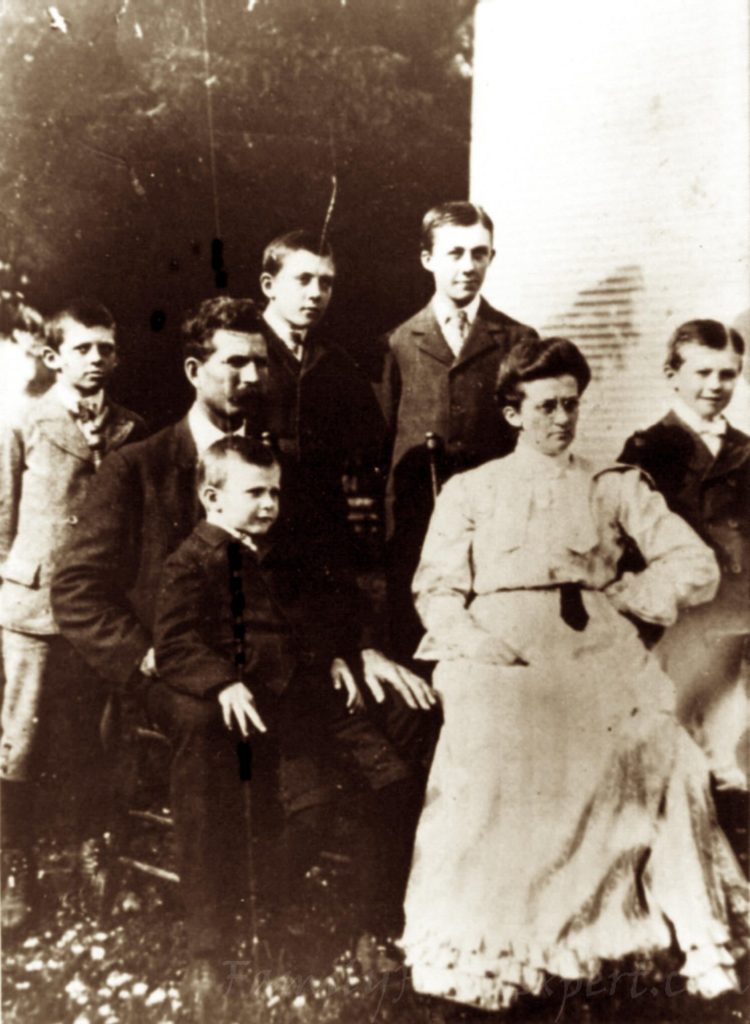
Amelia “Millie” Brace Phillips
Millie turned 60-years old in 1904. She and her retired husband, Tom, lived at 300 Lake Street, Aurora, Kane County, Illinois. Her sixth son, Harold “Hal,” was still single, but the other six boys had married. It is not known which years she was involved, but at some point, Millie served as the president of the Aurora Relief Corps No. 10. This was an auxiliary to the Grand Army of the Republic (G.A.R.) The intent of the group was to help the G.A.R. in preserving and strengthening those kind, fraternal feelings which bind together the soldiers, sailors, and marines of the late Rebellion, and to in inculcate love of country and patriotism among our members and children. It also assisted the G.A.R. men with charitable efforts for widows and orphans of fallen soldiers. The group was organized in 1884 and Millie’s name is tenth on the list of past presidents in a 1908 Kane County history book.
Barbara Mary Meyer Fawcett
Barbara Mary Meyer Fawcett was 23-years old, married to Harry Allen Lawrence Fawcett, and mother to a two-year old daughter, Lona Iona Fawcett, at the time of the 1904 presidential election. They lived in Odebolt, Sac, Iowa.
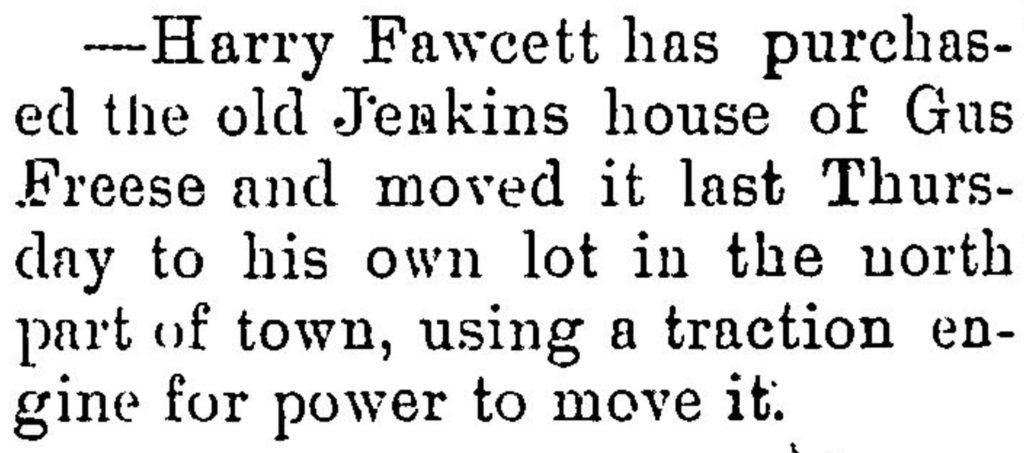
Helen Lucina Baldwin Fawcett
By 1904, 49-year old Helen had six grandchildren. All her kids were married. She and her husband, Hugh, still lived in Grinnell, Poweshiek County, Iowa.
Parker versus Roosevelt
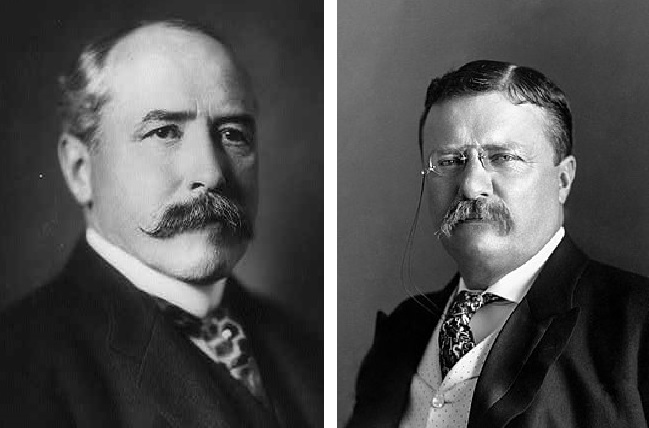
Alton B. Parker (D) v. Theodore Roosevelt (R).
Though he had not been never been elected president, Roosevelt was the incumbent. He had won as vice president in the previous election and then assumed the role of president when President McKinley was assassinated in September 1901.
Roosevelt had a lot of goals for the country, and had essentially started campaigning for reelection right after he took office in 1901. He pushed for expanding the National Park System. He also wanted to strengthen the United States’ influence on the world stage.
After running a liberal populist-like candidate in the previous two elections, the democrats tried to find a different kind of candidate. Alton B. Parker, a New York state appeals court judge was a moderate.
Parker really didn’t have much of a chance.
Parker did accuse Roosevelt of taking donations from big businesses in exchange for political favors.
Roosevelt had progressive policies towards business and labor, for example breaking up monopolies and intervening on behalf of striking coal miners, that made him look less pro-industry.
Roosevelt won by a landslide. He had 56.4% of the popular vote to Parker’s 37.6%. The third-party candidates won the rest of the popular vote with the Socialists getting 3% and the Prohibition party getting 1.9%. The only states that the democrats won were in the south.
1908












As was the case four years earlier, these twelve featured ancestors were denied the right to vote in the 1908 presidential election.
Barebo Engebretsdtr Torset Christianson
Barebo Engebretsdtr Torset Christianson, turned 60 in 1908. She and her husband, Björn Christianson Rukke, were still farming in Udolpho Township, Mower County, Minnesota. Since the previous presidential election, her daughters Mary, Jorine, and Lena, and son Ingebret had married. Clara, who never married, was probably working in Austin, Mower County, Minnesota, by then, but youngest son, Bennett, and daughters Maline, and Inga still lived at home.
Bertha H. Stemson Christianson
Barebo’s daughter-in-law Bertha H. Stemson Christianson was 31-years old at the time of the 1908 presidential election. Her family was still growing with two more children born since the last election. She had three daughters and three sons, Blanche, Hilda, Bennett, Charles, Inez, and Lawrence. The youngest was a newborn and the oldest was ten-years old. She and her husband continued to farm at Newry Township, Freeborn County, Minnesota.
Caroline Hilson Aldahl
At 45-years old, Caroline Hilson Aldahl was still raising her large family at the time of the 1908 presidential election. The eleven kids all still lived at home. Johanna was 22, George 21, Clara 19, Selmer 18, Ida 17, Hilda 15, Judith “Nellie” 14, Clarence was almost ten, Joe eight, Margaret six, and Martha was four.
Amelia “Millie” Brace Phillips
Amelia Brace Phillips was 64-years old at the time of the 1908 presidential election. All seven sons were married, and she was a grandma many times over. She and her husband were retired and lived in Aurora, Kane County, Illinois. The sons were all doing well. Guy was a prosperous farmer, Frank was a cement merchant and contractor in Aurora, Clarence was involved in real estate in Chicago, and Faye was farming in Culross, Manitoba, Canada. Edmund and Charles were expanding their asparagus growing operations and had become the largest shippers of asparagus in Kane county. They also sold threshing machinery and baled and sold hay.
Gertrude Lovin Boyce Phillips
By 1908, Gertrude was 43-years old. In addition to caring for her husband and five boys, her mother, Mary Jane Frost Boyce and sister, Mary Boyce, moved into the household. Sister Mary was disabled as a result of childhood polio. Mary Jane had been widowed many decades earlier, and, by then, was in her 80s.
Clara Christine Elsabe Freese Lemke Boettcher
Clara was 49-years old during the 1908 presidential election. She and husband August F. Boettcher continued to live in Wausau, Marathon County, Wisconsin. Kids Clara, Elsie, Otto, Ida, Max, and Lawrence lived at home. They ranged in age from ten to 20. August worked as a day laborer and Clara was as a midwife.
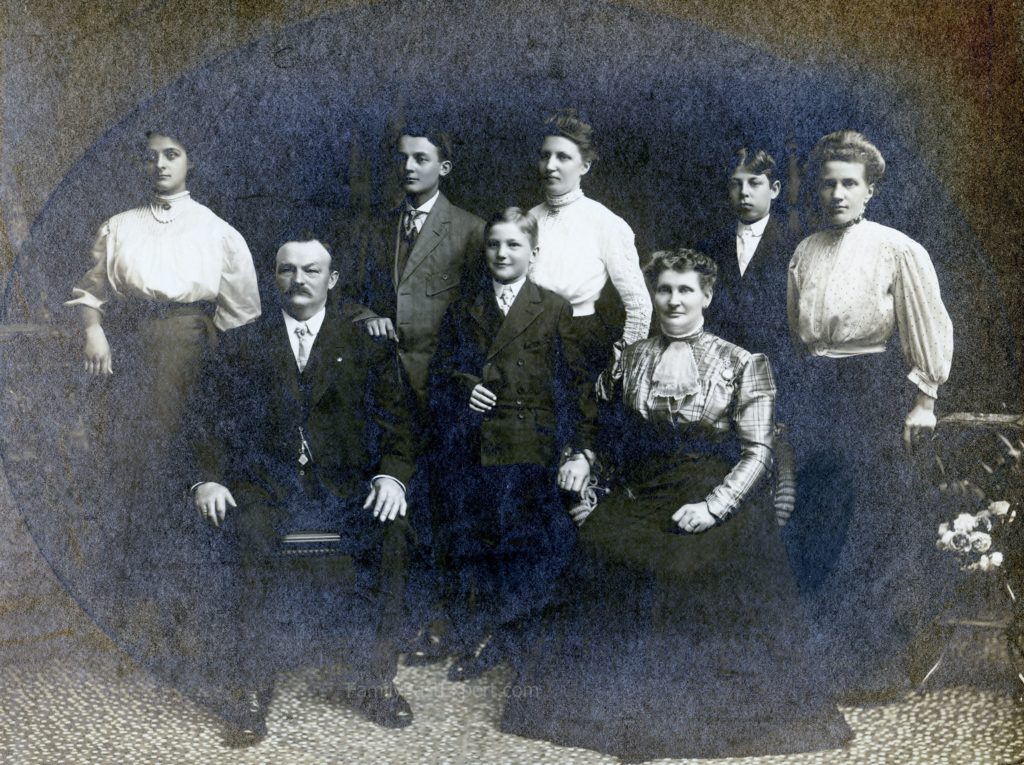
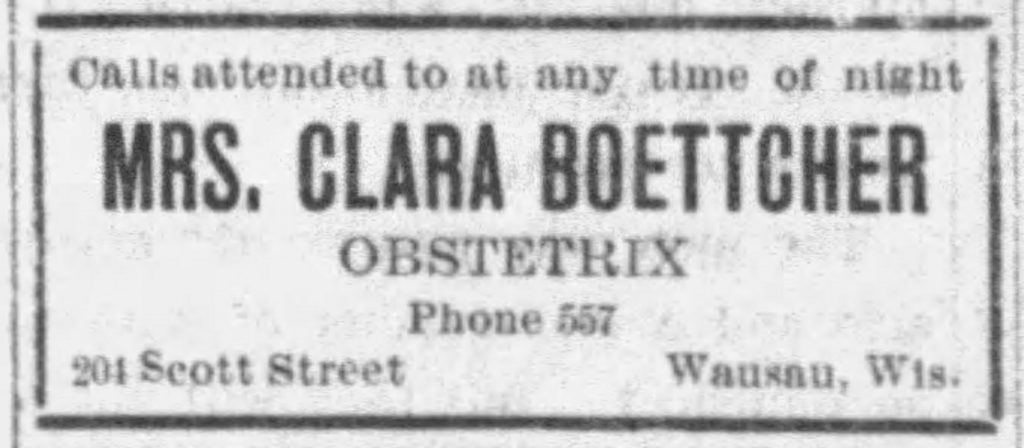
Frieda H. Lemke Krueger
At the time of the 1908 presidential election, Frieda was 27-years old. She still had five children, Sadie, age eight, Arnold, age seven, Bernhard “Ben,” age six, Irene, age five, and Norman, age four. Her husband, Bernhard, was still a laborer. During the winter months, he was away working at the lumber camps. A letter she wrote to him while he was working at Grandfather Falls, near Merrill, Lincoln County, Wisconsin, shows they had a loving relationship, but things were not easy at home without the husband and father being there. Money was tight, the kids missed their dad, and Frieda was not sure where she was going to get money for wood. Wives were supposed to be able to pick up pay from the lumber company office, but she was not sure how that worked. She was trying to earn money herself to pay for things, but just could not make enough.
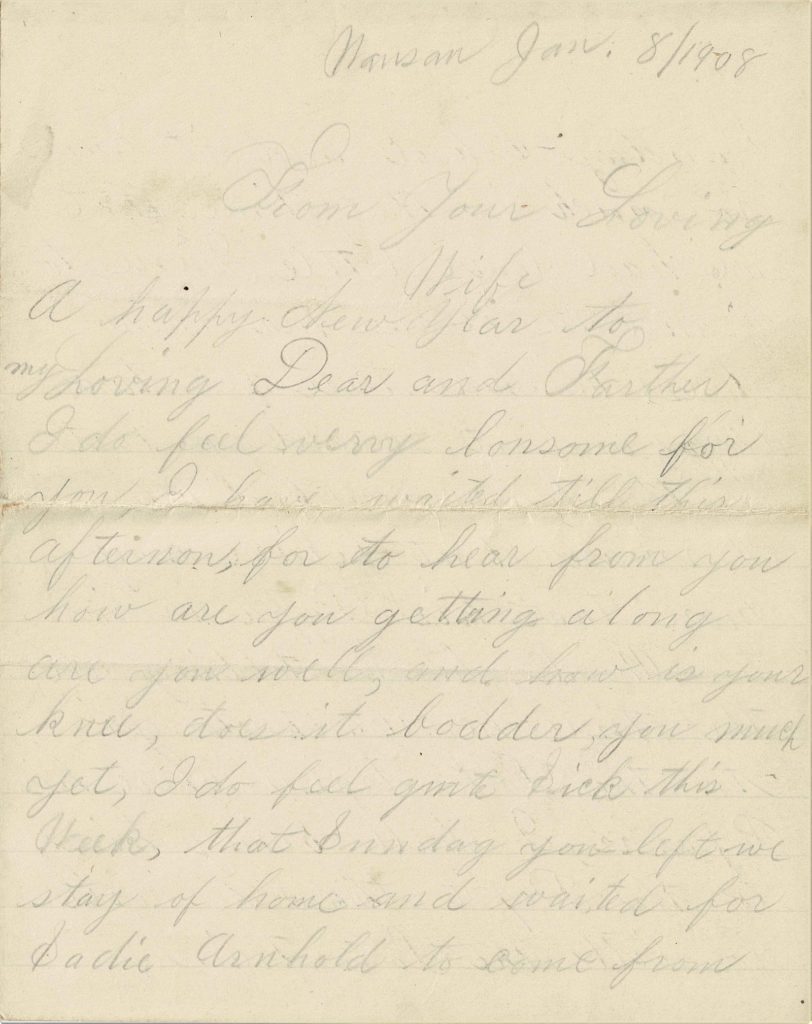
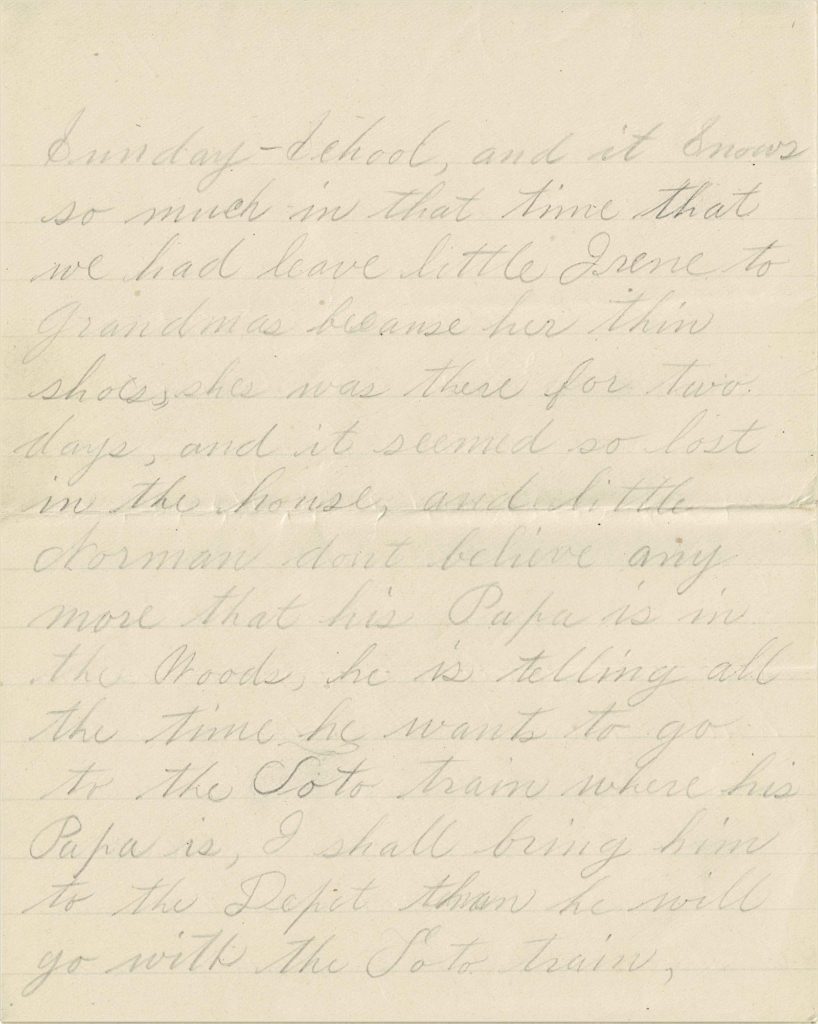
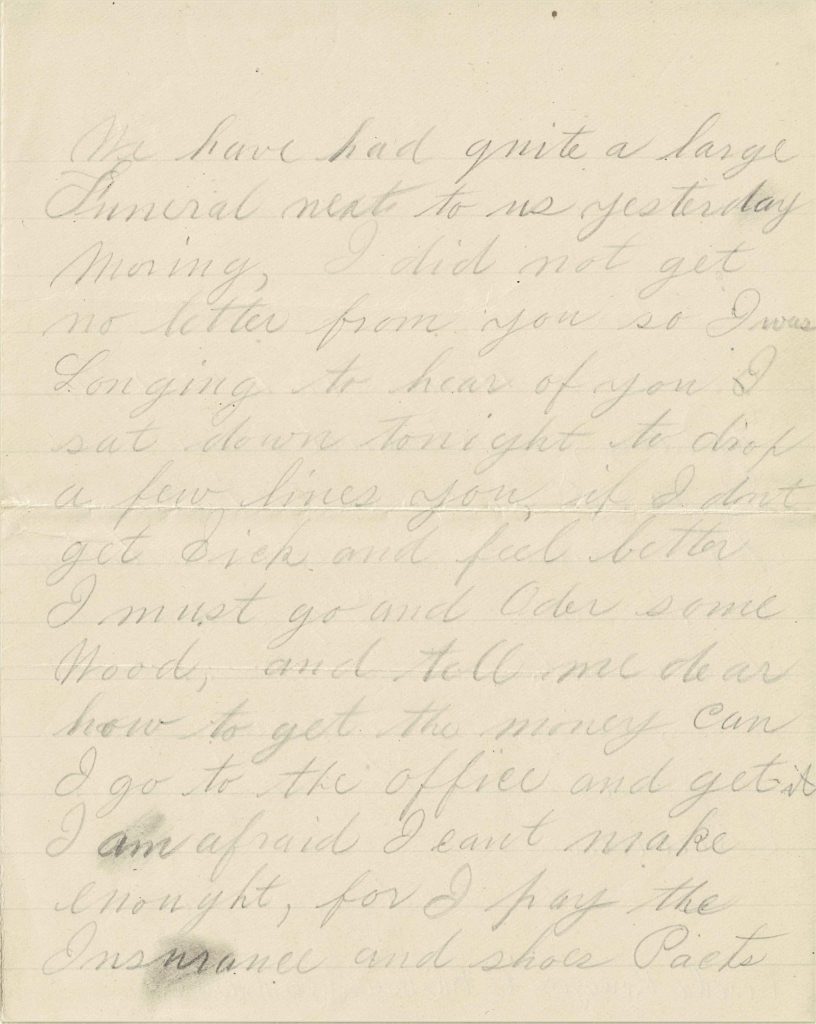
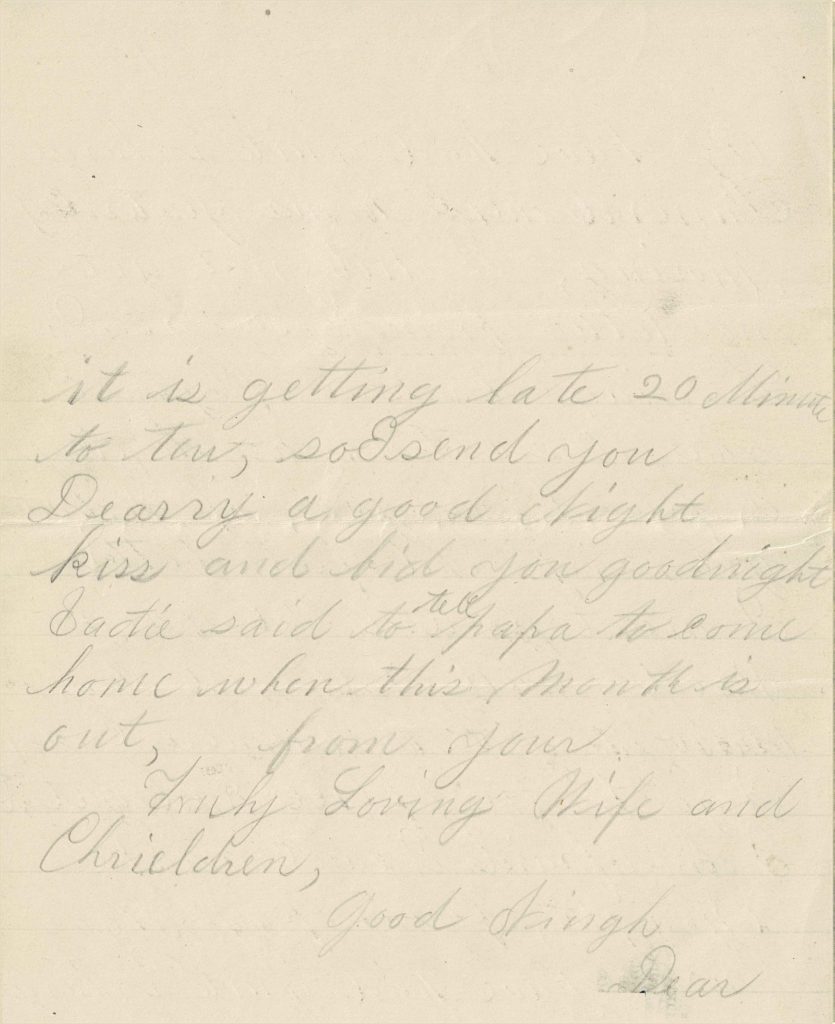
Alice Rosalie Fehlhaber Aschbrenner
Alice was 28-years old when the election was held in 1908. She and her husband, Fred, still only had one daughter, Selma, who was called Sally. But, they were expecting another child to be born early the next year. They still lived and worked their farm on Highway A, Town of Berlin, Marathon County, Wisconsin.
Bertha Auguste Henriette Kluender Aschbrenner
In 1908, Bertha turned 60-years old. Bertha and Frederick lived in their new home on their new farm in Stratford, Marathon County, Wisconsin. Daughter Laura married that year. Their children Henry, Frank, Samuel, and Hilda all lived at home.
Jane Elizabeth Cornell Miller
At the time of the 1908 presidential election, Jane was 55-years old. She and her husband, George, still resided on their farm at Big Rock, Kane County, Illinois. She was grandmother to nine
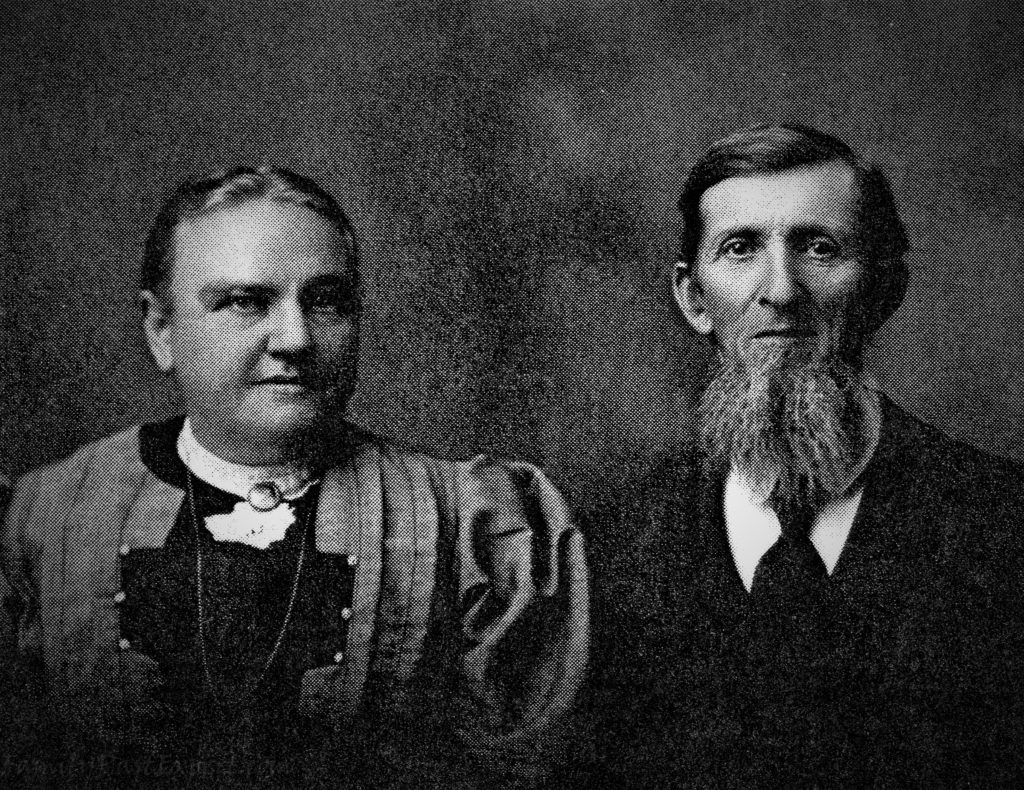
Helen Lucina Baldwin Fawcett
In 1908, Helen was 53-years old. She and her husband, Hugh, still lived in Grinnell, Poweshiek County, Iowa.
Barbara Mary Meyer Fawcett
By the 1908 presidential election, Barbara Mary Meyer Fawcett was 27-years old. She and husband, Harry, were living in Odebolt, Sac County, Iowa, raising their six-year old daughter.
Bryan versus Taft
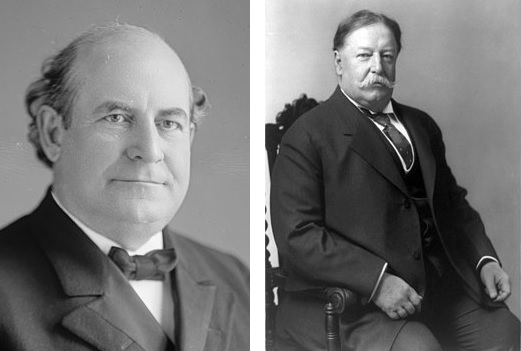
William Jennings Bryan (D) v. William Howard Taft (R).
President Roosevelt was extremely popular, but he had declared, upon being elected in 1904, that he would not seek re-election in 1908. He supported Taft, his secretary of war, so Taft was literally hand-picked to be his successor.
The Democrats decided to run Bryan for a third time.
The Republican platform was to continue what Roosevelt had started. They didn’t propose change. They also made fun of the Democrats for running Bryan as their candidate a third time in a row, using a slogan, “Vote for Taft now, you can vote for Bryan anytime.”
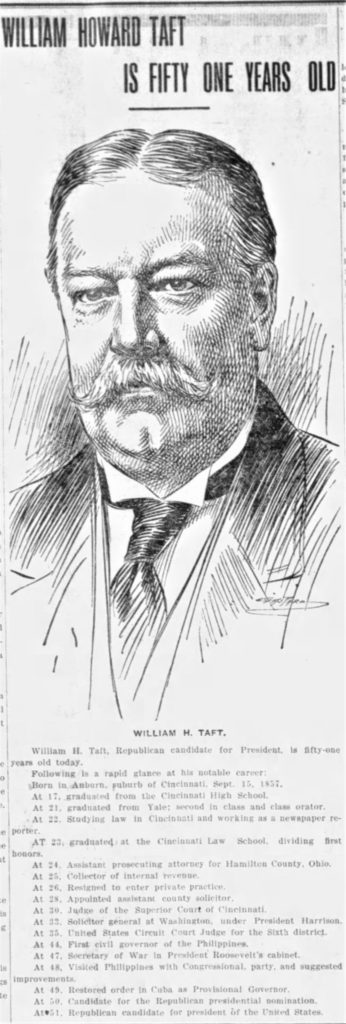
The Democratic platform rallied against the business elite and called for instituting reforms, such as regulating railroads and lowering tariffs. Bryan was in favor of new income and inheritance taxes. He also campaigned against the growing influence of corporations – he suggested that corporate donations to political parties should be made public. His campaign slogan was, “Shall the People Rule?”
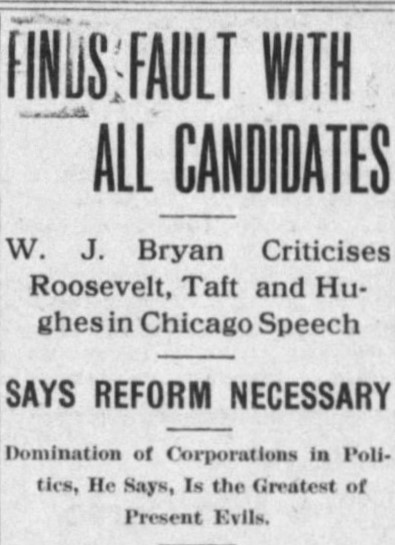
Bryan also called for a non-aggressive foreign policy.
Bryan swept the south, but Taft beat him with 321 electoral votes to 162.
William Howard Taft became the 27th President of the United States.
1912












As was the case four years earlier and eight years earlier, these twelve ladies were not allowed to vote in the 1912 presidential election.
Jane Elizabeth Cornell Miller
59-year old Jane Elizabeth Cornell Miller still lived on the farm at Big Rock, Kane, Illinois, at the time of the 1912 presidential election. Her husband was 81-years old by then, so they were probably at least partially retired from farming. All ten of their grandchildren were born by 1912.
Amelia “Millie” Brace Phillips
In 1912, Amelia “Millie” was 68-years old, and still living with her husband, Tom, in Aurora, Kane County, Illinois.
Gertrude Lovin Boyce Phillips
Gertrude’s household was getting smaller by the time 1912 arrived. Her sister, Mary Boyce, had died a year earlier, and oldest son, Roy, had married. Gertrude was then 47-years old. Back in 1905, Guy and his brother Ed had financed land in Canada for their other brothers Hal and Faye. Hal and Faye left Canada by 1912, but Guy and his boys decided to keep the land. Guy and the older sons farmed the land in Fannystelle, Manitoba, Canada. So, they split their time between there and Illinois. In 1912, they sold their farm on Jericho Road, Sugar Grove, Kane County, Illinois.
About that year land speculation was beginning to run wild and high… All of 1912, land speculations boomed into a boomerang. We sold the farm to Herb Rohrer for 189 acres @ $200 1/4 per acre = $39,847.25.
Gertrude Lovin Boyce, memoir.
Caroline Hilson Aldahl
At the time of the 1912 presidential election, Caroline was 49-years old. Her oldest daughter, Johanna, had married the previous year and Caroline became a grandmother in 1912. Her other children were still at home, namely, George, Clara, Selmer, Ida, Hilda, Nellie, Clarence, Joe, Margaret, and Martha. They ranged in age from 25 to eight-years old. Caroline and her husband, Lars, were still living on their farm in Lansing Township, Mower County, Minnesota.
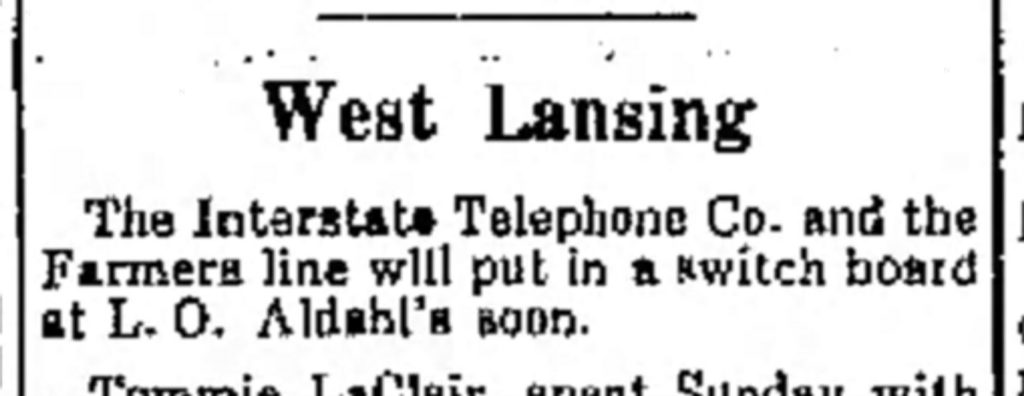
Bertha H. Stemson Christianson
1912 was a tough year for 35-year old Bertha H. Stemson Christianson. The year started tragically when her year-old son, Merrill Clifford, died. Another son, Clifford Selmer, was born a week after the election. At election time she was very pregnant and very busy on the Newry Township, Freeborn County, Minnesota, farm raising her children Blanche, Hilda, Bennett, Charles, Inez, and Lawrence.
Barebo Engebretsdtr Torset Christianson
Barebo Engebretsdtr Torset Christianson, was 64-years old in 1912. She and her husband, Björn Christianson Rukke, were living in Udolpho Township, Mower County, Minnesota. Their children Maline, Inga, and Bennett lived on the farm with them.
Helen Lucina Baldwin Fawcett
By 1912, 57-year old Helen had six grandchildren. All her kids were married. She and her husband, Hugh, still lived in Grinnell, Poweshiek County, Iowa.
Barbara Mary Meyer Fawcett
At the time of the 1912 presidential election, Barbara was 31-years old. She lived in Odebolt, Sac County, Iowa, with her husband, Harry, and 10-year old daughter, Lona.
Frieda H. Lemke Krueger
By 1912, Frieda was 31-years old and had six children. Sadie was twelve, Arnold was eleven, Ben was ten, Irene was nine, Norman was eight, and the youngest, John, was two. Frieda, Bernhard and family lived at 1002 6th Avenue South, Wausau, Marathon County, Wisconsin. Frieda was busy keeping house and looking after her children, but also found time to be involved in activities like the Underwood Memorial Mission Aid Society.

Clara Christine Elsabe Freese Lemke Boettcher
Clara was 53-years old at the time of the 1912 presidential election. She and husband August F. Boettcher continued to live in Wausau, Marathon County, Wisconsin. They had bought a house at 620 McClellan Street by 1912. Her son Max was living at home. In 1912, he was registered as an 18-year old barber. Their son, Lawrence, was only 14, but the other children had probably left home by then. When the Boettchers moved to their new home in 1910, it seems they didn’t need as many beds.
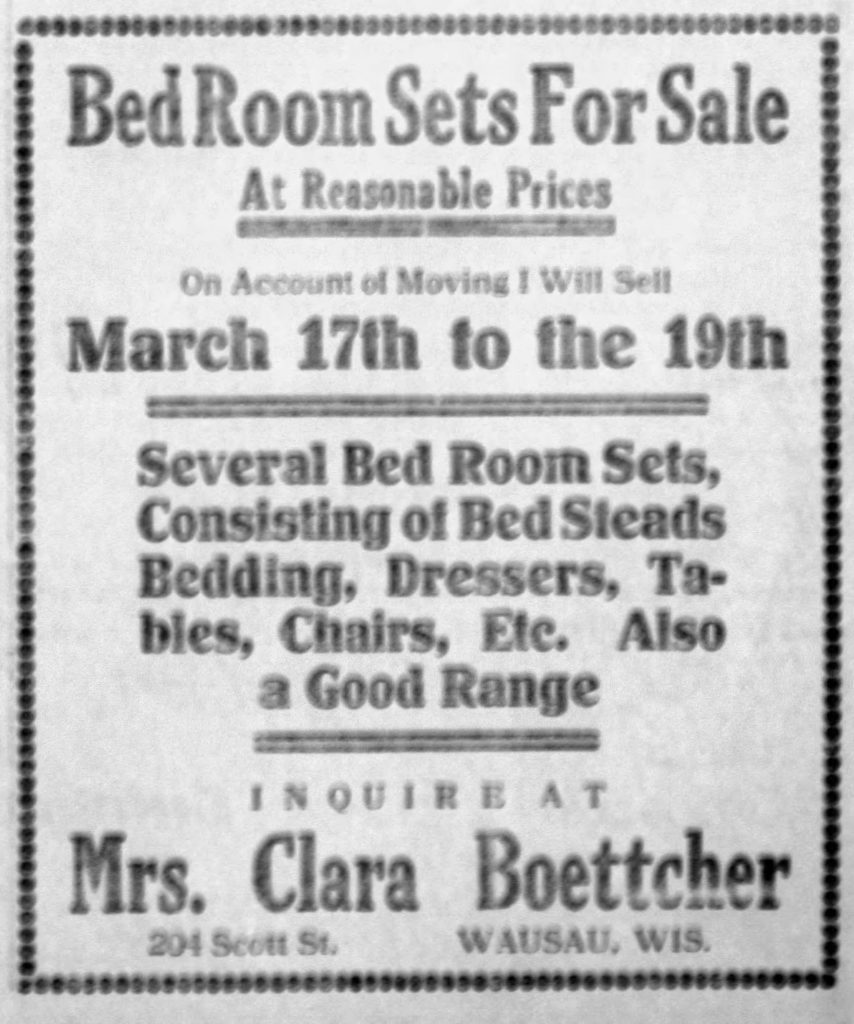
Alice Rosalie Fehlhaber Aschbrenner
In 1912, Alice was 32-years old. She and her husband Fred were busy raising their daughter, Selma, age eight and son, Frederick, age three. They worked their farm on Highway A, Town of Berlin, Marathon County, Wisconsin.
Bertha Auguste Henriette Kluender Aschbrenner
By 1912, Bertha was 64-years old. Bertha and her Civil War Veteran husband, Fred, lived in Stratford, Marathon County, Wisconsin. Their grown children Frank, Samuel, and Hilda still lived at home.
Wilson versus Taft versus Roosevelt
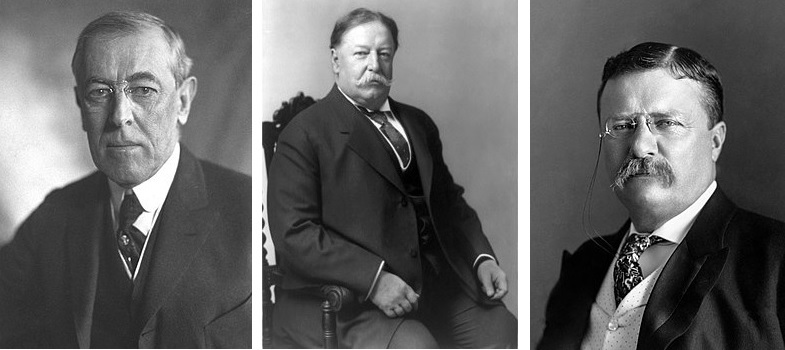
Woodrow Wilson (D) v. William Howard Taft (R) v. Theodore Roosevelt (Bull Moose – Progressive).
The 1912 presidential election was unique. There were three main candidates instead of two. The democrats ran Woodrow Wilson. The republicans tried to get William Howard Taft elected to a second term. But, a revolution of sorts was taking place in the Republican party.
Theodore Roosevelt had refused to run for reelection in the 1908 election and instead promoted Taft as his pick. While Roosevelt had been extremely popular, Taft was not. A large group of Republican progressives, called insurgents, held seats in both the House and the Senate. Like most of Americans, these insurgents wanted change. They wanted tariff reductions, an income tax, direct election of senators, and stricter railroad and corporation regulations.
Taft had lost support from these insurgent Republicans as well as the American people when, in 1909, he had signed a bill for higher tariff rates and called it the best tariff law ever. Taft had failed to promote the progressive platform that had begun under Roosevelt. The insurgent faction did not support Taft being the nominee, but Taft and conservative Republicans controlled the Republican National Committee (RNC). Taft got the nomination.
Roosevelt felt that the nomination had been stolen from him and led his followers out of the Republican convention. They formed a third party, called the Bull-Moose party, and made Roosevelt their nominee.
The Democrats selected Woodrow Wilson as their nominee.
Wilson ran on a progressive platform to get rid of monopolies, give opportunity to small business, reduce tariffs, reforms banks, and strengthen anti-trust laws.
Roosevelt and the Bull Moose party pushed an even more progressive agenda including pushing for changes control big business, tax reform, economic reform, and social reform. They proposed a minimum wage, a workers’ compensation act, a federal trade commission, child labor laws, government pensions for retirees, and funds to help people with health care costs. They even supporting women’s suffrage.
Theodore Roosevelt campaigned hard, even giving a planned speech immediately after being shot in an assassination attempt in Milwaukee. On his way to give a campaign speech after eating a meal at the Hotel Gilpatrick, Roosevelt walked to his car and was shot point-blank by an insane bartender. The assailant claimed that the late President William McKinley, whom Roosevelt had succeeded, had visited him in a dream and told him to avenge McKinley’s assassination by killing Roosevelt. Luckily, the bullet, aimed for Roosevelt’s heart, struck an eye-glass case and the folded 50-page speech that Roosevelt was about to give. Roosevelt only got a flesh wood and added to his speech, “You see, it takes more than one bullet to kill a Bull Moose.”
Taft didn’t have much agenda other than trying to beat Roosevelt.
In the end, Roosevelt beat Taft. But Wilson beat Roosevelt. Wilson won 435 electoral votes. Roosevelt got 88. Taft only got 8. Minnesota went for Roosevelt. All the other states in which our ladies resided went for Wilson.
Woodrow Wilson became the 28th president of the United States.
1916












As was the case four years earlier and eight years earlier and twelve years earlier, these twelve ladies were once again told they couldn’t vote. With three exceptions. Our Illinois ladies couldn’t vote for legislative offices, but they were allowed to vote in the 1916 presidential election.
Caroline Hilson Aldahl
In 1916, Caroline Hilson Aldahl was 53-years old. Caroline and her husband, Lars, were still living on their farm in Lansing Township, Mower County, Minnesota. Her daughters Johanna and Clara were married, and Caroline was grandmother to three. The other children, George, Selmer, Ida, Hilda, Nellie, Clarence, Joe, Margaret, and Martha, were still at home, ranging in age from 29 to 12.
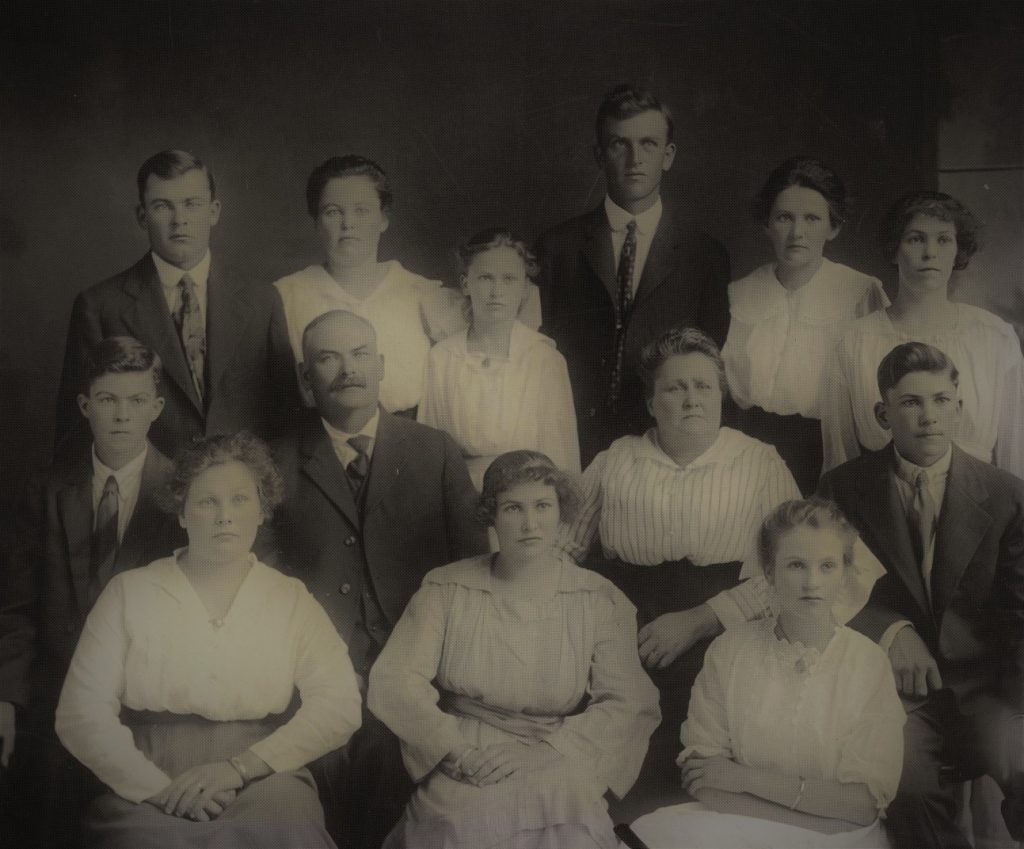
Frieda H. Lemke Krueger
At the time of the 1916 presidential election, Frieda was 35-years old and the mother of six growing children. Sadie, age 16, Arnold, 15, Bernard, 14, Irene, 13, Norman, 12, and John, age six, likely took up most of her time. She and the kids were involved with the Underwood Chapel, a Sunday School associated with the Presbyterian church.
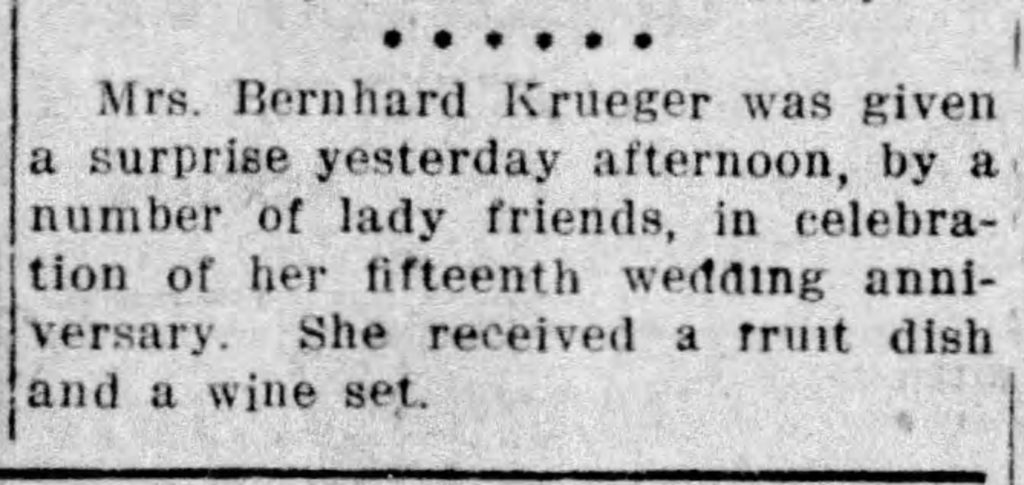
Barbara Mary Meyer Fawcett
35-year old Barbara, her husband, Harry, and their 14-year old daughter, Lona, still lived in Odebolt, Sac County, Iowa, in 1916.
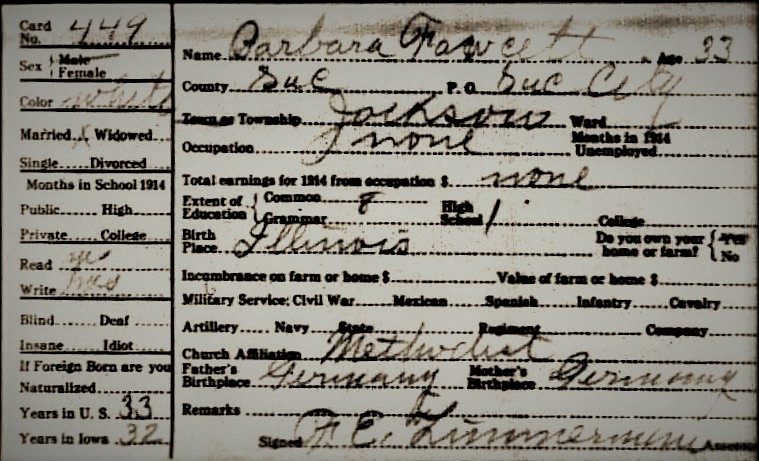
Helen Lucina Baldwin Fawcett
In 1916, Helen Lucina Baldwin Fawcett was 61-years old. She and her husband, Hugh, lived in Grinnell, Poweshiek County, Iowa. By the time of the presidential election, she had ten grandchildren.
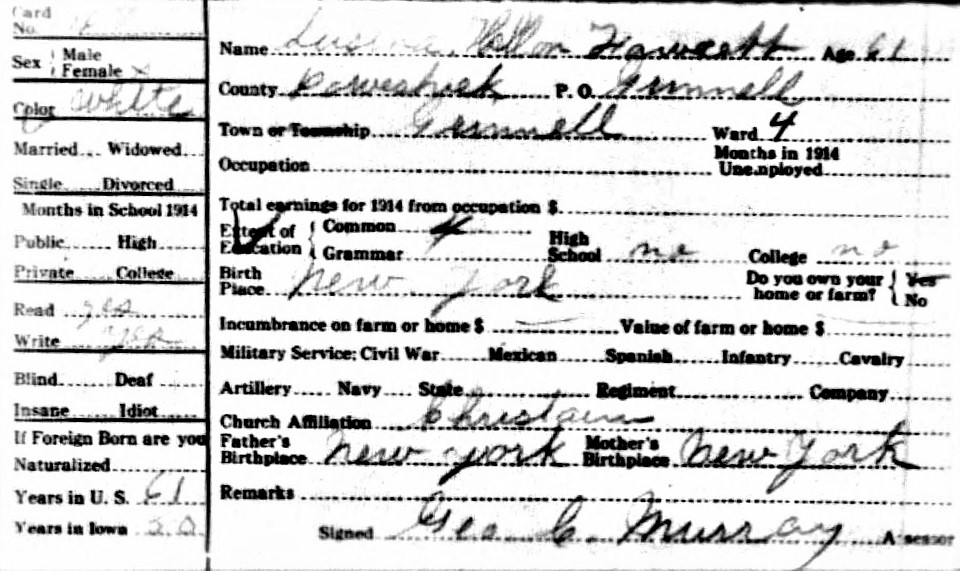
Bertha Auguste Henriette Kluender Aschbrenner
Bertha K was 68-years old when the 1916 presidential election was held. Bertha and her husband, Fred, lived in Stratford, Marathon County, Wisconsin. Their grown children Frank, Samuel, and Hilda still lived at home.
Alice Rosalie Fehlhaber Aschbrenner
Alice was 36-years old in 1916. She and her husband, Fred, were busy raising their daughter, Selma, age 12 and son, Frederick, age seven. They worked their farm on Highway A, Town of Berlin, Marathon County, Wisconsin.
Clara Christine Elsabe Freese Lemke Boettcher
Clara was 57-years old at the time of the 1916 presidential election. She and husband August F. Boettcher continued to live in Wausau, Marathon County, Wisconsin at 620 McClellan. She continued to work as a midwife.
Barebo Engebretsdtr Torset Christianson
Barebo, was 68-years old in 1916. She and her husband, Björn were living in Udolpho Township, Mower County, Minnesota. Their children Inga and Bennett lived on the farm with them.
Bertha H. Stemson Christianson
By 1916, Bertha H. Stemson Christianson had given birth to nine children. At the time the kids ranged in age from one to 18. The older kids were old enough to be helpful to Bertha and Christian Bennett Christianson on their Newry Township, Freeborn County, Minnesota, farm. Bertha was 39-years old.
Amelia “Millie” Brace Phillips
Amelia “Millie” Brace Phillips could vote for president in 1916! The 19th amendment had not yet passed, but back in 1913, Illinois had given women the right to vote for presidential and municipal offices. They couldn’t vote for state or federal legislators, but they could vote for president. Millie was 72-years old at the time of the election. She still lived in Aurora, Kane County, Illinois, with her husband. Her seven boys had all married and by 1916, they had given her sixteen grandchildren, fifteen of whom were still living. We don’t know if she actually cast her vote for president, but she was allowed to do so, finally, in 1916, at age 72!
Gertrude Lovin Boyce Phillips
In 1913, Gertrude and Guy Phillips had left their Jericho Road farm and moved to the original Phillips homestead on Base Line Road. That property was divided between Guy and his six brothers. Guy got 17-acres and buildings. Guy and the boys continued to go to Canada to farm. 1915 had shown a banner crop making the Canadian venture seem promising. At the time of the 1916 presidential election, Gertrude was 51-years old. She was entitled to vote for president! Illinois allowed it. She couldn’t vote for state or federal legislators, but she could vote for president. We don’t know if she exercised her right. If she did, she likely voted republican. Guy was said to have been “a republican in political affiliation” and to have had, “advanced ideas on the centralization of schools” and to have been “a strong advocate of the graded-school system.”
Jane Elizabeth Cornell Miller
At 63-years old, Jane Cornell could vote in the presidential election! She and husband, George, continued to live on their Big Rock, Kane County, Illinois, farm. They still had children and grandchildren living near then, though son Calvin moved to Iowa in 1915 and daughter, Elvira, lived in Minnesota for a while. Jane’s teenage granddaughter Leona Catherine Miller, wrote of Jane often in her diary. Leona’s mother, Mary Stolp Miller, who was Jane’s daughter-in-law, passed away on 15 May 1915. Jane was important in the lives of her son Frank and granddaughter Leona.
Sun. Jan. 11, 1914: The sun shone nearly all day. We went up to Grandma’s. Thursday Feb 19, 1914: The sun shone. Cold wind from the north. We made ice. Didn’t quite get through. Aunt Dell, Lawrence and Grandma came down here while Uncle Ned and Grandpa went to town. I went to school. Sunday Feb 15, 1914: Cold and snowed. We went to Grandmas. Sunday, March 8, 1914: Cloudy most of the day. We went up to Grandma’s. Uncle Hoyt’s folks and Uncle Calvin’s were up there too. Sunday, March 29, 1914: Rained and was cloudy all day. We went up to Grandma’s. Thursday, April 16, 1914: The sun shone. I went to school. Pa went to Hinckley. Grandma and Grandpa came down and stayed over night. Grandma taught me to make tatting. Sunday, June 7, 1914: The sun shone. It was terrible hot. We went up to Grandma’s. We got some berries. Thursday, July 2, 1914: The sun shone. We finished making hay at noon. We made a freezer of ice cream. Mamma and I took Burton home and stayed to Grandma’s to supper. Thes Boyd was here a while. Tuesday, July 21, 1914: The sun shone. It was warm. Grandma, Grandpa, Edna and the preacher were down here all day. We went up to John’s at night. While Pa and John went to picnic meeting, Dorothy was here. Wednesday, Aug. 5, 1914: The sun shone. I went up to Armstrong’s to take my music lesson. Grandpa and Grandma came down about supper time. Thursday, Aug. 6, 1914: The sun shone. Grandma, Mamma and I went over to Stahl’s in the afternoon for awhile. Monday, Aug. 10, 1914: The sun shone. Grandma and Grandpa went home Saturday and came back this morning. Carrie Williams had the thrashers to dinner and supper. Ma and I helped her at night. Pa and the machine man had to go to Little Rock at night. Sprinkled. Wednesday, Aug 12, 1914: The sun shone. Pa took Grandma home in the morning. We went to Ernest Wilkenings funeral. Pa was a bearer. Sunday, Aug. 30, 1914: The sun shone. We went up to Grandma’s. Pa went up to the school house. Thursday, Oct. 8, 1914: The sun shone. We went to school. Mamma went over to Ed Jay’s with Carrie Williams to a committee meeting. Grandma and Grandpa came down and stayed to dinner then went on to Sandwich. I went to Stahl’s to a surprise party on Hildred. It was her eighteenth birthday. Friday, Oct. 9, 1914: The sun shone in the morning. Cloudy in the afternoon and rained at night. I went to school. Pa and John helped Apples hull clover. Grandma and Grandpa came back here. Saturday, Oct. 10, 1914: Rained all morning. Cleared up in the afternoon. Grandma and Grandpa went home. We went to the carnival at night. Pa went to Tommy Thompson’s funeral with Bert Ovitt. Sunday, Oct. 11, 1914: The sun shone. It was nice. We went up to Grandmas. All the rest were there and gave Grandpa a flash light for his birthday. Monday, Nov. 2, 1914: The sun shone. I went to school. Mama and Frances washed. Papa went up to Wilson’s to husk corn. Grandma and Grandpa came down a little while in the afternoon. Tuesday Jan 26, 1915: The sun shone. I went to school. Grandma, Grandpa, Uncle Ned and Aunt Dell were here all day. Edwin hauled corn for Mrs. Wilkening and ice for Shults. Sunday Feb 7, 1915: The sun shone a little. We went up to Grandma’s. Sunday March 7, 1915: Cloudy. We went up to Grandma’s. Wednesday March 24, 1915: The sun shone. I went to school. Hildred went to Plano so I came home alone. Grandma and Grandpa came down. Friday March 26, 1915: The sun shone. We washed. I went to school. Grandma and Grandpa went home. Monday April 5, 1915: The sun shone. It was warm. I went to school. Grandpa and Grandma came down. Pa started to sow oats in the afternoon. Tuesday April 6, 1915: The sun shone. Warm. I went to school. They had a post card show on mama. Grandpa made garden. Thursday April 8, 1915: The sun shone, warm. I went to school. Grandma and Grandpa went home. It rained at night. We went up to John’s a few minutes at night. Pa went to town. Sunday May 9, 1915: The sun shone. We went up to Grandmas and to Uncle Neds. Friday May 14, 1915: The sun shone some. I went to school. The doctor came up again. Cold. Grandma and Grandpa came down. Tuesday May 18, 1915: Rained a little. The sun shone in the afternoon. We went to the funeral. The wind was awful cold. Grandma and Grandpa staid all night with us. Wednesday May 19, 1915: Cloudy, rained, cold. Grandma was sick all night. Aunt Louise and Ralph stopped here at night. Pa and I went to town in the afternoon. Thursday May 20, 1915: Cloudy, cold. We took Grandma and Grandpa home. Lottie came down in the afternoon. Rained. Sunday May 23, 1915: The sun shone. Warmer. We went to the cemetery and to Grandma’s. Rained at night. Tuesday June 1, 1915: The sun shone. It was a nice day. I went to school. Pa went to Plano again and bought a corn plow. We went up to Grandma’s at night. I run the auto up. Sunday June 13, 1915: The sun shone. We went to the cemetery and up to Grandma’s. We staid for the children’s exercises. Monday June 14, 1915: Cloudy and rained all day. Cold. Tuesday June 15, 1915: The sun shone. We washed in the morning and went to Aurora in the afternoon. Grandma went along. I got a new white dress. The sun shone. Warm. We went up to Grandma’s in the evening. Papa’s cousin was here from Michigan. Wednesday June 30, 1915: The sun shone. We went up to Grandma’s at night. John and Lottie went with us. Thursday July 1, 1915: Partly cloudy. Grandpa brought Grandma down in the morning. We washed. John and Lottie came down in the evening and got some cherries. Friday July 2, 1915: Partly cloudy. Aunt Louise came up and got some cherries. We took Grandma home at night. Sunday July 18, 1915: Trained in the forenoon. We went to the cemetery in the morning and to Grandma’s in the afternoon. Saturday July 24, 1915: It rained. We went up to Woodstock. Grandma, Grandpa and Burton went with us. They didn’t have any rain up there, but had an awful storm down here. Sunday July 25, 1915: Cloudy all day. We came home from Woodstock and left Bernice at DeKalb. Sunday Aug 15, 1915: The sun shone. We went to the cemetery in the morning. Took Mrs.Warner to Georges. Staid to dinner and went to Grandma’s in the afternoon. Went down and got Fern at night. Friday August 27, 1915: The sun shone. Grandma and Grandpa came down. Dug early potatoes. Hauled oats for Eddie Stahl. We went down to Neddie Thompsons at night. Saturday Aug 28, 1915: The sun shone. Grandma and Grandpa went home. Reinette came over. Irene, Hildred and Reinette went to town with us. Sunday Sept 12, 1915: We went to the cemetery and up to Grandma’s. The sun shone. Warm. Monday Sept 13, 1915: The sun shone. Pa took me to school and came after me because Tommy got down in the stahl and couldn’t go. We went up to Grandmas at night. Friday Sept 17, 1915: The sun shone. I went to school. Jeanette came home with me. We went up to Grandmas at night to get some grapes. Sunday Oct. 17, 1915:
– Leona Catherine Miller, diary.
Pa went down to Stahls for the morning. Rained hard. We went up to Grandma’s. They got home Wednesday. Tuesday Oct. 26, 1915: The sun shone. I went to school. Pa ironed and went up to Grandmas. We went to town at night. Wednesday Oct. 27, 1915: The sun shone. Put a wall under the east side of the crib. Grandpa and Grandma came down. I went to school. We went to Thompsons after supper. Thursday Oct 28, 1915: The sun shone. Quite cold. Grandma and Grandpa went home. I took some cider to Mr. Thompson. I went to school. Pa went to Uncle Neds. Sunday Oct 31, 1915: Awful windy. The sun shone. We went up to Grandma’s to dinner. Stopped a little at Uncle Ned’s and went up to Aurora and got Aunt Bell. The auto bothered on the way home. Sunday Nov 7, 1915: The sun shone. Hot. We went up to Grandmas. Mary Miller was there. We went for a ride in the afternoon. Sunday, Dec 5, 1915: The sun shone. Pa went to Little Rock in the morning. Took Mildred home after dinner and went up to Grandma’s. Uncle Hoyts were there. Saturday, Dec 25, 1915: Cloudy. Nice day though. We went up to Grandma’s. Uncle Neds were there. Sunday, Jan 23, 1916: The sun shone. Muddy. We drove up to Grandma’s. Sunday, February 20-1916: Went up to Grandma’s. Sunday, April 8, 1917: This is Easter. We went up to Grandma’s. Grandma had my corset cover finished. Mr. & Mrs. Markusse went away too. Our new egg beater is a dandy. Beat some cream for the jello in no time almost. I got supper and did dishes. Lina wasn’t here to supper. Thursday, Mar. 29, 1917: Cloudy and windy. Pa took Frank, Claude Wilson up to Aurora. I staid at Grandma’s. Dad got the machine washed. I thought he had traded with someone. Pa brought some new music.
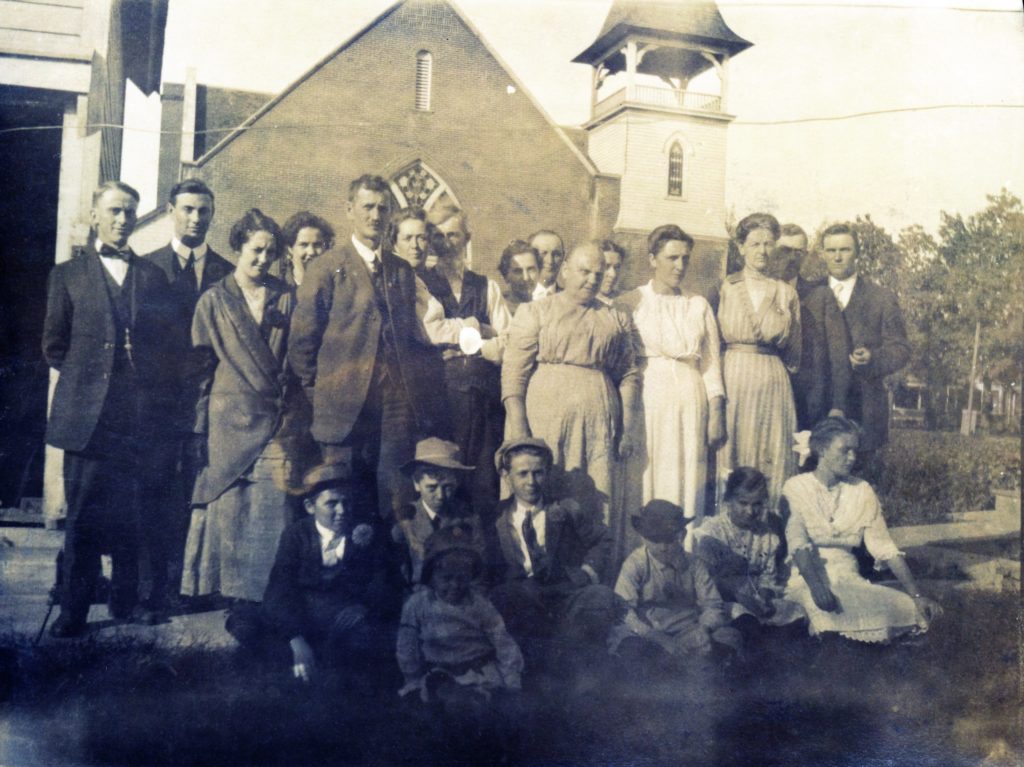
Wilson versus Hughes
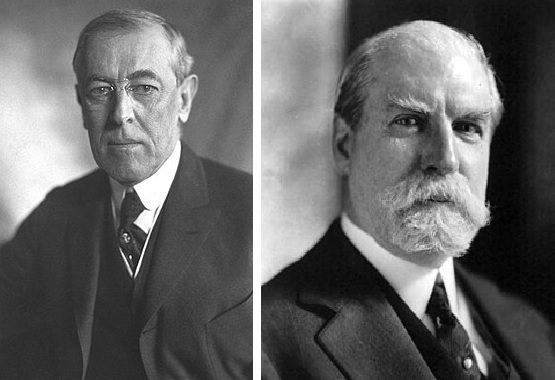
Woodrow Wilson (D) v. Charles Evan Hughes (R).
The election of 1916 pitted Democratic incumbent Woodrow Wilson against the Republican Charles Evan Hughes.
Wilson’s first term accomplished several progressive goals. Tariffs were reduced, an income tax was implemented, the Federal Reserve System was put in place, an antitrust act was passed, and the Federal Trade Commission was established.
In his 1916 platform, Wilson pushed for the creation of an agency to regulate overseas shipping, establishing government loans for farmers, increasing income and inheritance taxes, prohibiting child labor, and instituting an eight-hour work day for railway workers.
Wilson also reminded Americans that he had kept us out of the World War. This was only 1916. People didn’t know what was coming in the future.
Wilson would not support a women’s suffrage amendment.
He also supported segregation and did little to attract black voters.
The Republicans were trying to regroup after the unfortunate 1912 election.
They selected Hughes as their candidate. But Hughes wasn’t very exciting. He criticized Wilson for remaining neutral on the war in Europe even though the public was generally happy with staying out of the conflict. He also criticized Wilson for failed efforts to overthrow the military dictatorship in Mexico. The Republicans also got personal, criticizing Wilson for remarrying too quickly after the death of his first wife.
Hughes, did however, support women’s suffrage.
It was a close election. Wilson had 277 electoral college votes to Hughes’ 254. Minnesota, Wisconsin, Illinois, and Iowa, where our ladies lived, all went for Hughes.
Missed elections
We’ve now learned what was going on in presidential politics from 1868 through 1916. We’ve seen that three of our female ancestors did have the right to vote for president in 1916. None of our ladies had full voting rights yet, though.
In our next post, we’ll learn about the historic 1920 election and all that was going on as our women made their decisions on how to cast their votes.
Selected Sources:
File:AltonBParker.png, Wikimedia Commons, (https://commons.wikimedia.org/wiki/File:AltonBParker.png : accessed 12 Jul 2020).
File:BRYAN, WILLIAM JENNINGS LCCN2016856655 (cropped).jpg, Wikimedia Commons, (https://commons.wikimedia.org/wiki/File:BRYAN,_WILLIAM_JENNINGS_LCCN2016856655_(cropped).jpg : accessed 12 Jul 2020).
File:Charles Evans Hughes cph.3b15401 (cropped).jpg, Wikimedia Commons (https://commons.wikimedia.org/wiki/File:Charles_Evans_Hughes_cph.3b15401_(cropped).jpg : accessed 12 Jul 2020).
File:Mckinley.jpg, Wikimedia Commons, (https://commons.wikimedia.org/wiki/File:Mckinley.jpg : accessed 12 Jul 2020).
File:President Roosevelt – Pach Bros.jpg, Wikimedia Commons, (https://commons.wikimedia.org/wiki/File:President_Roosevelt_-_Pach_Bros.jpg : accessed 12 Jul 2020).
File:Thomas Woodrow Wilson, Harris & Ewing bw photo portrait, 1919.jpg, Wikimedia Commons (https://commons.wikimedia.org/wiki/File:Thomas_Woodrow_Wilson,_Harris_%26_Ewing_bw_photo_portrait,_1919.jpg : accessed 12 Jul 2020).
File:William Howard Taft cph.3b35813.jpg, Wikimedia Commons (https://commons.wikimedia.org/wiki/File:William_Howard_Taft_cph.3b35813.jpg : accessed 12 Jul 2020).
“United States presidential election of 1896,” Encyclopaedia Britannica (https://www.britannica.com/event/United-States-presidential-election-of-1896 : accessed 12 Jul 2020).
“Free Silver Movement,” Encyclopaedia Britannica (https://www.britannica.com/event/Free-Silver-Movement : accessed 12 Jul 2020).
“Free Silver,” Wikipedia (https://en.wikipedia.org/wiki/Free_silver : accessed 12 Jul 2020).
Richard Pallardy, “United States presidential election of 1900,” Encyclopaedia Britannica (https://www.britannica.com/event/United-States-presidential-election-of-1900 : accessed 12 Jul 2020).
John M. Cunningham, “United States presidential election of 1904,” Encyclopaedia Britannica (https://www.britannica.com/event/United-States-presidential-election-of-1904 : accessed 12 Jul 2020).
“United States presidential election of 1908,” Encyclopaedia Britannica (https://www.britannica.com/event/United-States-presidential-election-of-1908 : accessed 12 Jul 2020).
“United States presidential election of 1912,” Encyclopaedia Britannica (https://www.britannica.com/event/United-States-presidential-election-of-1912 : accessed 12 Jul 2020).
Richard Pallardy, “United States presidential election of 1916,” Encyclopaedia Britannica (https://www.britannica.com/event/United-States-presidential-election-of-1916 : accessed 12 Jul 2020).
“41e. The Election of 1896,” U.S. History (https://www.ushistory.org/us/41e.asp : accessed 12 Jul 2020).
“1900 United States presidential election,” Wikipedia (https://en.wikipedia.org/wiki/1900_United_States_presidential_election : accessed 13 Jul 2020).
“Bed Room Sets For Sale,” 16 Mar 1910, page 5 (https://www.newspapers.com/image/271930704/ : accessed 13 Jul 2020), Wausau Daily Herald, Wausau, Wisconsin
Rodolphus Waite Joslyn, History of Kane County, Ill, Volume 1 (Pioneer Publishing Company, 1908), pp. 648-9 (https://books.google.com/books?id=bRIVAAAAYAAJ : accessed 14 Jul 2020).
“William Jennings Bryan,” Spartacus Educational (https://spartacus-educational.com/USAbryan.htm# : accessed 16 Jul 2020).
“Finds Fault With All Candidates,” Wausau Daily Herald (Wausau, Wisconsin) 20 Mar 1908, page 5 (https://www.newspapers.com/image/271626394/ : accessed 16 Jul 2020).
“William Howard Taft is Fifty One Years Old,” Wausau Daily Herald-Record (Wausau, Wisconsin) 15 Sep 1908, page 4 (https://www.newspapers.com/image/271647156/ : accessed 16 Jul 2020).
“1908 United States presidential election,” Wikipedia (https://en.wikipedia.org/wiki/1908_United_States_presidential_election : accessed 16 Jul 2020).
“43f. The Election of 1912,” U.S. History (https://www.ushistory.org/us/43f.asp : accessed 16 Jul 2020).
“West Lansing,” The Austin Daily Herald (Austin, Minnesota), 23 Nov 1910, page 3 (https://www.newspapers.com/image/24394857/ : accessed 21 Jul 2020).
“Theodore Roosevelt shot in Milwaukee,” History (https://www.history.com/this-day-in-history/theodore-roosevelt-shot-in-milwaukee : accessed 01 Aug 2020).
Tom Giffey, “Five of the Biggest Political Events in Wisconsin History,” Volume One, 21 Jul 2020 (https://volumeone.org/articles/2020/07/21/100865-5-biggest-political-events-in-wisconsin-history : accessed 01 Aug 2020).
“Teddy Roosevelt Shot Here,” RoadsideAmerica (https://www.roadsideamerica.com/story/31048#:~:text=On%20October%2014%2C%201912%2C%20after,Roosevelt’s%20dead%20predecessor%2C%20William%20McKinley. : accessed 01 Aug 2020).
“Roosevelt’s Wound Proves Dangerous,” Wausau Daily Record-Herald, 15 Oct 1912, page 1 (https://www.newspapers.com/image/272332014/ : accessed 01 Aug 2020).

